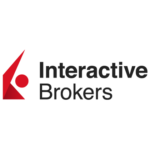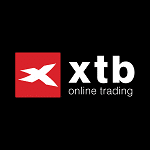-
 Richard Berry
Richard Berry
- Updated
Oil trading platforms let you buy and sell WTI crude and Brent Oil through derivatives products such as futures, options, CFDs and financial spread betting. You can use our comparison of what we think are the best oil trading platforms in the UK to compare commission, minimum deposits and what market access different brokers offer from CFDs, futures and options to financial spread betting and oil investing products like ETFs.
| Oil Broker | Oil Trading Costs | Minimum Deposit | Overnight Funding | Customer Reviews | More Info |
|---|---|---|---|---|---|
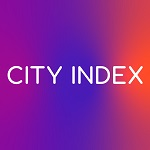 | 0.3 | £100 | 2.5% +/- SOFR | 3.8
(Based on 124 reviews)
| See Platform 69% of retail investor accounts lose money |
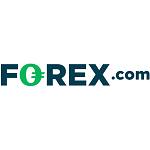 | 0.3 | £100 | 2.5% +/- SOFR | 4.2
(Based on 19 reviews)
| See Platform 74% of retail CFD accounts lose money. |
 | 025 | £1 | 2.9% +/- SOFR | 4.6
(Based on 86 reviews)
| See Platform 71.9% of retail investor accounts lose money |
 | 0.4 | £50 | n/a | 3.7
(Based on 146 reviews)
| See Platform 76% of retail investor accounts lose money |
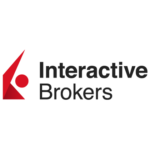 | 0.0007% | $2,000 | 1.5% +/- SOFR | 4.5
(Based on 1,330 reviews)
| See Platform 59.7% of retail investor accounts lose money |
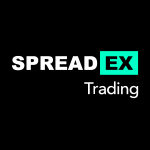 | 0.28 | £1 | 3% +/- SOFR | 4.3
(Based on 257 reviews)
| See Platform 61% of retail investor accounts lose money |
 | 0.28 | £250 | 2.5% +/- SOFR | 3.9
(Based on 678 reviews)
| See Platform 68% of retail investor accounts lose money |
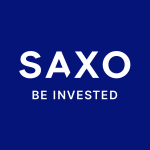 | 0.28 | £1 | 2.5% +/- SAXO RATE | 3.6
(Based on 74 reviews)
| See Platform 62% of retail investor accounts lose money |
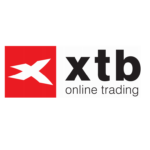 | 0.3 | £1 | 6.4% +/- SOFR | 3.7
(Based on 149 reviews)
| See Platform 72% of retail investor accounts lose money |
 | 0.3 | £1 | +8.5% / 0.5% | 4.6
(Based on 136 reviews)
| See Platform 64% of retail investor accounts lose money |
❓Methodology: We have chosen what we think are the best oil trading platforms based on:
- over 17,000 votes in our annual awards
- our own experiences testing the oil trading accounts with real money
- an in-depth comparison of the features that make them stand out compared to alternatives.
- interviews with the oil broker’s CEOs and senior management
City Index: Best Oil CFD trading platform
- Costs & spreads: 0.3
- Minimum deposit: £100
- Account types: CFDs & spread betting
CFDs are complex instruments and come with a high risk of losing money rapidly due to leverage. 69% of retail investor accounts lose money when trading CFDs with this provider. You should consider whether you understand how CFDs work, and whether you can afford to take the high risk of losing your money.
City Index Gives Traders A Huge Range Of Added Value & Markets
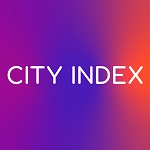
Provider: City Index
Verdict: City Index offers some of the best trading tools and analysis to help traders perform better. Their unique post-trade analytics and voice brokerage service make it an excellent choice for large and frequent traders. City Index is also one of the oldest spread betting and CFD brokers based in the UK founded in 1983 and offer trading in over 13,500 financial markets, to around 126,000 active clients. City Index is currently owned by StoneX, a US brokerage listed on the NASDAQ valued at over $4bn.
CFDs are complex instruments and come with a high risk of losing money rapidly due to leverage. 69% of retail investor accounts lose money when trading CFDs with this provider. You should consider whether you understand how CFDs work, and whether you can afford to take the high risk of losing your money.
Is City Index a good broker?
I really like City Index and have used them for years. They offer some of the best trading tools and analysis to help traders perform better. Their unique post-trade analytics and voice brokerage service make it an excellent choice for large and frequent traders.
A big plus for me is that they are one of the oldest and most established trading platforms offering CFDs and financial spread betting, with a huge range of markets to trade, post execution analytical tools and trading signals.
Some of the best trader tools around
I opened my first City Index account way back in 2008, when they were one of only a handful of spread betting firms catering to high net worth traders in the City of London. Back then when I was a derivatives broker at MF Global, City Index used to hedge their CFD business through us so I could see they always had a fairly sophisticated client base. But over the years, as traders and investors have become more educated and akin to taking more risk, City Index now takes on more and more private clients.
If you’re thinking about trading with City Index, but haven’t quite made up your mind yet, I’ve tested all their trading platform’s features, visited their offices and interviewed their senior management for my review to hopefully provide enough information for you to decide if they are the right broker for you.I’ve always liked City Index, it’s been a stalwart of the London CFD broker scene since it was founded by Chris Hales and Jonathan Sparke in 1983 as a way for institutions to hedge their exposure through spread betting and CFDs. But soon became popular with more retail traders. Always advertising on billboards in the City, always having a colourful client base, always being bought and sold at the whim of billionaires and bigger boys. But in recent years, it had gone off a bit from its glory days. Back in the good ol’ days, you could open an account and put on a million-dollar trade over the phone with no ID, no deposit, and no idea. Well, you could if you happened to be on a yacht with Michael Spencer (the then City Index owner and City grandee), who was convinced he knew which way the Euro was headed and goaded one of his guests into putting the trade on, as the story goes away.
But those days are long gone and incumbent brokers have to fight hard to differentiate themselves against the fintechs nipping at their heels, as well as provide more trader tools to lure new customers back to traditional markets away from the wild west of Crypto.
City Index seems to have matured nicely though, it’s grown out of its lumbering adolescence under the ownership of Gain Capital and is now owned by US Behemoth StoneX (previously INTL FCStone). Since then, the platform has had a few upgrades and long-term investment products will hopefully be added shortly.
City Index Awards
In our latest awards City Index won “best trading app” in 2024 and “best trader tools” 2023. City Index has in previous years won “best trading platform”, “best trading app” & “best forex broker” in 2022.
Giles Watts, Senior VP of UK & EU at City Index said after winning best trader tools in 2023: “We are delighted to have been recognized for the added value we provide our clients. Delivering actionable post trade insights direct to the platform, is just one of the reasons our clients stay with us over the long term.”
Trading Platform
The City Index platform used to have a slightly off-the-rack feel about it, instead, the business relied on word of mouth and friendly referrals from HNW clients who would use experienced dealers to work large orders over the phone. Whilst voice brokerage still forms part of City Index’s offering, they are, as with everyone else, doing the majority of their business online and working hard to make their platform stand out.
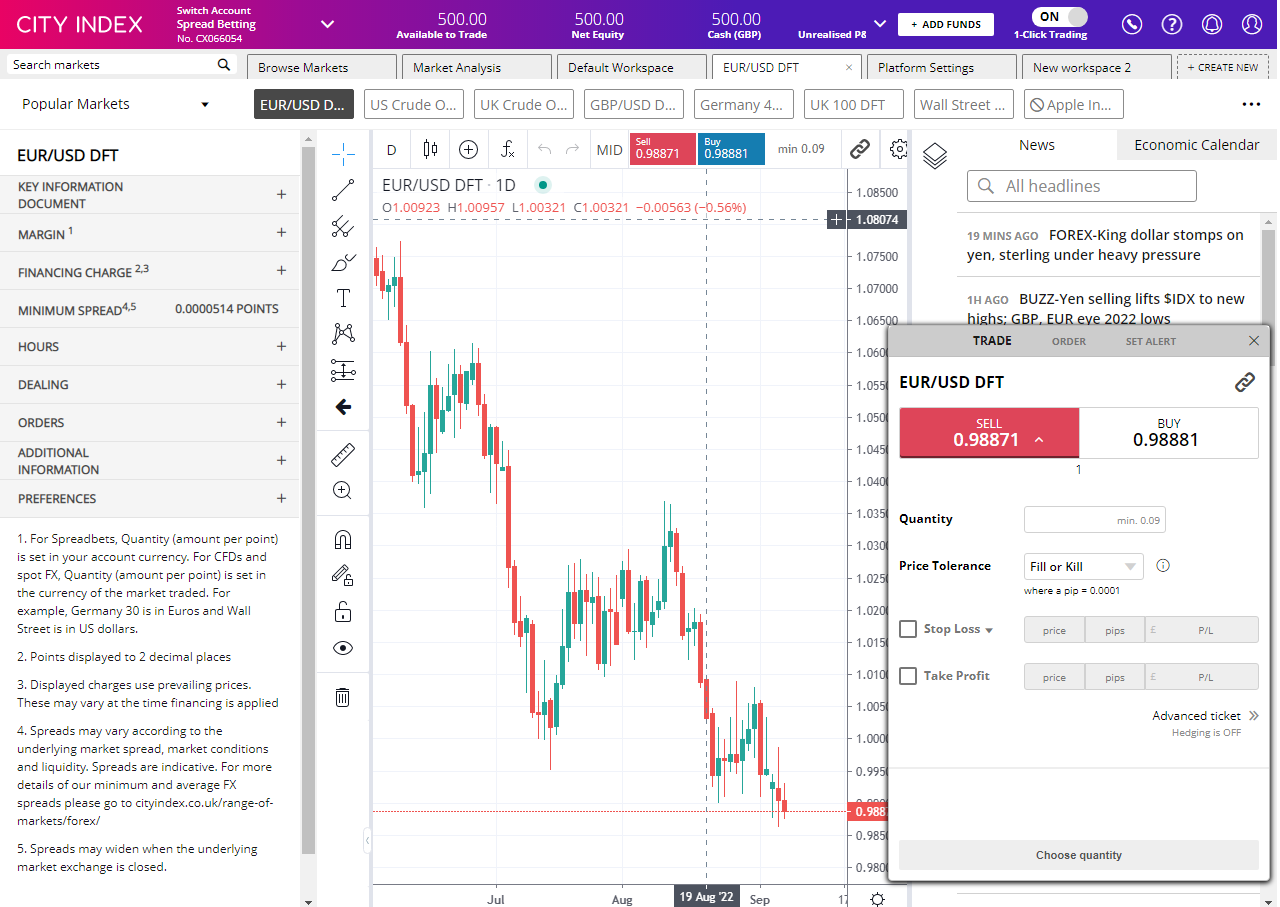
Pricing & Spreads
City Index has always been competitive with it’s pricing. As City Index is an OTC broker they charge customers by widening the spread rather than adding commission after you trade. They are one of the cheapest around for trading UK stocks with the bid/offer being widened by only 0.08% (20% less than the industry standard of 0.1%) and for US stocks they only charge 1.8 cents per share (industry standard is 2 cents per share). Overnight financing rates are also inline with what you would expect 2.5% over/under SONIA rates.
Stocks, Forex, Indices and Commodities
You can buy over 13,500 stocks on City Index as a CFD or financial spread bet, however, you can’t trade equity options or invest in physical shares.
Obviously, they have access to more than the usual forex, index and commodity markets and add value with some nice thematic-themed indices (like ESG), and a good pool of sectors to speculate on. You can also trade options (CFD or spread bets thereof) on a good range of indices and commodities like Natural Gas or EU stocks. Plus, you can trade on synthetic markets. Everyone loves a bit of volatility speculation in choppy markets.
Spread Betting
Spread betting is City Index’s forte, and it’s the product that a lot of their high-net-worth customers use for trading stocks. As one of the original spread betting brokers City Index offers access to one of the widest selections of UK, US and European shares (as well as the major indices). The key advantage of spread betting of course is that profits are free of capital gains tax.
CFD Trading
Unlike spread betting CFD profits are subject to capital gains tax, so are less popular among UK traders. Historically, City Index would offer CFDs to more professional traders and spread betting to smaller clients. CFDs and spread betting are similarly priced with City Index, with the commission being included in the spread, which is slightly wider than the underlying market bid/offer. The main reason why both products are on offer is that spread betting is only available to UK residents, whereas City Index can offer CFD trading to its global client base.
Trading App
I actually prefer the City Index app to the desktop version of the trading platform. Sometimes I can find the desktop version to be a bit clunky, but the app is really slick, and clearly in our mobile-first world, where all the recent development has been focused. And why not, the desktop trading platform is brilliant for research, trading signals and post-trade analytics, but at the point of execution the app is a quick and simple stripped-down version with all the salient features front and centre.
MT4 (MetaQuotes)
You can trade on MT4 and MT5 with City Index, but functionality and market access is not as good as their main proprietary trading platform or some of their MT4 competitors. You can only trade around 84 markets on MT4 through City Index, but if you just want to trade the major markets, City Index is a good broker for MT4 based on their regulation, service and pricing.
Performance Analytics
Another acquisition from parent StoneX is Chasing Returns, now integrated into the platform as Performance Analytics. Which really drills down into where you are trading well and where you are losing money. Performance Analytics can break down your wins and losses and tell you what markets you trade best, what time of day you are most profitable, if you make money trading in quick succession or, if you do better if you take a break between trades. It’ll even tell you if your first trade of the day is often a winner or loser, or if you are a better bull or bear and also if you are as good at trading volatility as you pretend to enjoy doing, but letting you know if you trade better in calm or erratic markets.
Economic Calendar
One thing, though that does let them down is City Index’s economic calendar, it’s terrible. In fact, most brokers, even IG just have a bog standard list of upcoming earnings and economic announcements. But I think you need more from a trading platform these days, especially as when logged into the desktop platform the format is all off. One broker that has absolutely nailed their economic calendar is ThinkMarkets. With TM when you’re logged in you get a really good visualisation of previous data, volatility and most importantly what impact it had on relevant institutions like EURUSD. It’s a great way to see how markets have moved against previous numbers. Honestly, City Index should embed this too as it’s available from Trading Central who they have a deal with anyway.
Extended Hours Trading
You can trade CFDs premarket and after the market closes on a range of US equities in the pre and post-market sessions which bookend regular share trading in New York that takes place between 9.30 a.m. and 4.00 p.m. Eastern time.
The list of 73 stocks available to trade in the pre and post-markets includes leading US shares such as Apple, Microsoft and Nvidia. Widely traded names such as the Ark Innovation ETF, Coinbase, Robinhood and Gamestop.
As well as established blue chips like Bank of America, Boeing, Procter and Gamble, and Walmart, alongside a selection of index-tracking and thematic ETFs.
Verdict, overall, a great all-round platform that is backed by one of the largest financial institutions in the world.
Pricing: Always competitive, especially for major markets.
Market Access: Excellent coverage, especially for small-cap stock and exotic currency pairs.
Platform & Apps: Some excellent added value trading signals and portfolio analytics (even though the desktop version can be a bit fiddly).
Customer Service: Lots of experienced dealers to help with any issues, who you can get through to on the phone.
Research & Analysis: City Index excels here, lots of educational guides, trading ideas and analysis, to keep traders aware of major market moves.
Pros
- Excellent trading tools
- Post-trade analytics
- Publicly listed (part of StoneX)
Cons
- Trading only, no investment account
- Limited options markets
- No direct market access
-
Pricing
(5)
-
Market Access
(5)
-
Online Platform
(4.5)
-
Customer Service
(5)
-
Research & Analysis
(4.5)
Overall
4.8Forex.com: Oil & Currency Trading
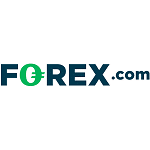
- Costs & spreads: 0.3
- Minimum deposit: £100
- Overnight financing: 2.5% +/- SOFR
- Account types: CFDs
CFDs are complex instruments and come with a high risk of losing money rapidly due to leverage. 74% of retail investor accounts lose money when trading CFDs with this provider. You should consider whether you understand how CFDs work, and whether you can afford to take the high risk of losing your money.
FOREX.com Won Best Forex Broker in our 2025 Awards

Provider: FOREX.com
Verdict: FOREX.com is one of the largest forex brokers operating globally and owned by Nasdaq-listed institutional broker StoneX. Forex.com offers traders access to 7,000+ assets including 80+ currency pairs, thousands of stocks, popular commodities, indices and cryptocurrencies (pro accounts only in the UK & EU). Pricing is competitive, especially for those on the RAW spread account or active trader programmme.
The products and services available to you at FOREX.com will depend on your location and on which of its regulated entities holds your account. Pricing may also vary depending on your region and the specific entity that manages your account.
CFDs are complex instruments and come with a high risk of losing money rapidly due to leverage. 74% of retail investor accounts lose money when trading CFDs with this provider. You should consider whether you understand how CFDs work, and whether you can afford to take the high risk of losing your money.
Is FOREX.com a Good Trading Platform?
FOREX.com won Best Forex Broker in the 2025 Good Money Guide Awards.
Plus, as well as being regulated by the top tier FCA in the UK, FOREX.com is regulated by CySEC, NFA, CIRO, MAS, ASIC, CIMA, and FSA with access to over 7,000 markets, exclusively via CFDs.
24-Hour FOREX.com Test
I took FOREX.com out for a 24-hour test drive, to trade with real money and try out some of the key features on the streets of the City of London. Here’s what happened…
“For FX sake”, I thought to myself when faced with writing a review about a forex broker. Firstly because all these brokers do is offer access to the forex market (or so I believed). Secondly, because I’ve never had much success with forex trading. I find the nuances of intra-day technical analysis too complicated.
I’m an old-fashioned trader – I like to look at the market and think it’s either overvalued or undervalued and, in my mind anyway, that’s easier when looking at a company’s share price, an index or even a commodity. But for some reason, with forex trading, I’ve never really got the hang of it.
Having said that, I have dealt currency for about 20 years now, but more as a broker rather than as a trader. For instance, I used to do some prime brokerage for institutions that would hedge their currency exposure when buying aeroplanes.
But I was so frustrated with how opaque pricing was in currency trading, that I decided to start up my own currency brokerage specialising in high-value currency transfers (£250,000 upwards) and undercutting everyone. It was called Berry FX, you can still see the demo on YouTube. Basically, personal service with the best rates anywhere ever. But now I just let other currency brokers compete for clients by trying to offer the best exchange rates.
But you want to know what I think of FOREX.com.
24 Hour Test
I took FOREX.com out for a 24-hour test drive around the City of London, putting some real trades on whilst going about my business to see if I could make any money.
I started out at the Bank of England with £10,000 on account at 11:30am. Lunch was a few minutes’ walk from the tube station, so I took the opportunity to put some trades on using FOREX.com’s trading signals. I’ve used these for years; back in 2018, they were known as GetGo and it was a standalone forex trading app. When I reviewed it then, I said these were the future of forex trading signals but are they still?
There are a couple of things that make these signals better than the rest.
- They tell you the success rate.
- The signal is linked to an order ticket.
When I was walking down King William Street to L’Antipasto to meet some contacts for lunch, I put a few trades on. First, I looked at the traders that had a historic success rate of over 50% and followed them. Then I looked at trading signals that had a success rate of less than 50% and traded against them. It’s a pretty simple strategy that generally works (not always, though). I used the classic stop/limit risk/reward ratio, aiming for twice the potential loss as a potential win. Again, simple forex trading strategies. The market is not hard to call, but if you get a trade right, it often pays to let it run for longer, but if it’s wrong, close it sooner.
Trading Central
On the way to my next meeting, I took a few moments on London Bridge to look at some of the other signals on FOREX.com: Trading Central. Now, Trading Central has been providing technical analysis to brokers for decades and supplies a constant stream of manually and automatically updated trading ideas throughout the day to give traders an indication of where the markets may go.
It’s not as fluid as the trading signals, as you have to put the trades in manually, but still gives you a bit of stimulus. This is great for someone like me because I generally have an idea of what I want to do from eyeballing a chart (I did, after all, run a technical analysis division for 5 years), but it’s nice to get confirmation of your thoughts one way or another.
Execution
When you are actually trading there are some great other features on the app:
- Swipe to trade: a bit like Tinder (so I hear)
- Chart on tickets: with a quick tap, you can bring up a chart when on the order ticket (to double-check)
- Working orders on charts: when looking at a chart, you can see your working orders and positions
- Position potential: as well as seeing what margin is required when placing a trade, you can also see and set your stops and limits as a potential monetary amount instead of pips
Post-Trade Analytics
Once you’ve done a bit of trading, you can review your trading history and see where you do well and where you can improve. This is a great feature as it can break down how well you trade by time of day, markets or volatility.
You can also set up “Play Maker” if you have a trading strategy and want to stick to it. Obviously, you can’t get that sort of data in a 24-hour test drive, so I’ll have to revisit that another time.
Demo Account
FOREX.com has a pretty good demo account. In fact, it’s hard to tell the difference between the demo and live trading platform. You get the same functionality and as trades are OTC, the same prices.
However, when I opened a demo account to test it, I already had a real account. So after I got my demo account login details, I clicked through to the “Webtrader” portal and (funny or alarming, depending on how you look at it) my live account details were auto-filled in by Google Chrome.
Now, had I not been checking my email, to ensure that the platform had sent me through my credentials, I might not have noticed that I was logging into a live account. It could have been disastrous if I’d started trading away thinking it was paper money. Even more so as you get £10,000 in demo funds and I’d deposited £10,000 in my live account when I took FOREX.com on a 24-hour trading signal test drive.
It reminded me of when a trader thought that he was trading on a demo account and put $1bn worth of orders through and then sued his broker because it voided his €10m profits.
TradingView & MetaQuotes
I had a good play about with TradingView, as it’s now the go-to destination for traders. TradingView is a sort of social network for traders where you can view charts (they are excellent) and post trading ideas (take with a pinch of salt). As TradingView has grown, it has also become an execution venue, so you can link your FOREX.com trading account and deal straight from the charts. This shouldn’t be too much of a stretch for most traders as the charts on the app and web-based platform are provided by TradingView (which, incidentally, is one of the largest financial-based websites in the world now).
You can also trade on MT4 or MT5 (but only MT5 in the EU), if you are into that sort of thing…
Am I a Forexpert?
I did make money on day one, mainly thanks to putting on a GBP-USD trade that covered most of the losses from some of the other trades. When I used the trading signals 5 years ago, I also made money. Day 2 wasn’t so good. On my way to an investor show, I gave back a few pennies but still ended up on top. But I have to admit my traders were calculated guesses rather than heavily researched positions.
I don’t like holding positions overnight, as day trading reduces not only your margin requirements but also increases the amount of sleep you get because you don’t wake up with cold sweats in the middle of the night worrying about Asian interest rates.
Overall would I recommend forex.com? Yes, if you are going to trade forex and don’t know where to start, as it’s a massive brand with global reach and owned by a listed brokerage with an institutional pedigree. As far as box-ticking is concerned, it ticks the lot. Or should I say pips the lot…
Pros
- Trading signals
- Post trade analytics
- Forex specialist
Cons
- Limited market range
- No DMA
-
Pricing
(4.5)
-
Market Access
(4.5)
-
Online Platform
(5)
-
Customer Service
(4.5)
-
Research & Analysis
(4.5)
Overall
4.6Pepperstone: Automated Oil trading on MT4
- Costs & spreads: 0.25
- Minimum deposit: £1
- Account types: CFDs & spread betting
71.9% of retail investor accounts lose money when trading CFDs with this provider
Pepperstone is a great broker for automated trading and active traders

Provider: Pepperstone
Verdict: Pepperstone is a great all round broker for active traders looking for low costs. Especially for those that want to automate their trading as they are one of the biggest and best MT4 brokers with a very good set of EA packages. Pepperstone were founded in 2010 in Australia and have since then grown to be a global brokerage with international offices and around 400,000 active clients. They offer spread betting and CFDs on 1,200 major market instruments, which means they focus on the most heavily traded assets, mainly forex and indices trading. Of those 900 are shares on the major stocks on international exchanges.
71.9% of retail investor accounts lose money when trading CFDs with this provider
Is Pepperstone a good broker?
Pepperstone is a great trading platform for traders who want low costs, wide market access and wide range of trading platforms, including one of the best MT4/MT5 packages available to retail traders worldwide.
Pricing: Razor tight pricing (on their Razor account).
Market Access: Mainly FX, but lots more stocks are being added.
Platform & Apps: Pepperstone’s MT4 and cTrader packages are top-notch.
Customer Service: Local offices around the world and personal account managers for large active traders
Research & Analysis: Lots of education and technical and algo indicator documentation.
Yes, I’ve used both trading platforms that Pepperstone offer, MT4/5 and cTrader, which include TradingView charting. cTrader is a more traditional trading platform with a basic layout, simple order execution and sentiment indicators. Whereas MT4 is one of the most popular and complex trading platforms available used by millions of traders and thousands of brokers.
However, what makes Pepperstone’s MT4 offering stand out is the brokerage behind it. Pepperstone offers it’s MT4 clients experienced account executives based in London and other local offices around the world. Plus, Pepperstone have put together a package of expert indicators and trader tools that are available to download for free that can be plugged into MT4.
To win business Pepperstone competes on price and compared to other trading platforms it is one of the cheaper options. For example, the Razor account can offer forex trading with zero pips, with the commission charged post-trade. Or traders can opt for the standard account, which adds a 1 pip markup, but is built into the spread.
One of the interesting things about Pepperstone is that whilst they do the traditional digital advertising, they are not on football shirts (apart from the Tennis and now sponsoring Aston Martin) and as Tamas said in his interview, a lot of their business comes from referrals, which is always a good sign. They are a global brokerage so you can at the moment trade crypto, but only if you are a professional client in the UK or are in a jurisdiction that hasn’t banned crypto derivatives.
Management: If you want to know more about the man currently running Pepperstone you can read my interview with Tamas Szabo, who has been Group CEO of Pepperstone since 2017, joining from IG where he started in 1996. So plenty of experience at the helm, Tamas, has been in the business for 25 years.
One of the interesting things about Pepperstone is that whilst they do the traditional digital advertising, they are not on football shirts or anything like that and as Tamas said in his interview, a lot of their business comes from referrals, which is always a good sign.
As I said Pepperstone offers CFD trading for international clients and spread betting for UK customers. Spread betting of course unique to the UK as trades are structured as bets so if you make money trading you don’t have to pay capital gains tax on your profits.
Trading Platforms: Pepperstone doesn’t actually have its own proprietary trading platform instead they offer TradingView, MT4/5 and cTrader. MetaTrader is gradually pushing brokers and clients to MT5 because it’s faster and a bit more user friendly, however, there is a lot of resistance from traders, especially those that use EA’s or Electronic Advisors, as most have been written for MT4 and can’t be converted for MT5 without being re-written.
Automated Trading: If you haven’t used one an EA, an Electronic Advisor enables you to trade automatically based on certain market criteria, usually based on technical analysis. So if the market does x, you buy, if the market does y you sell. The idea is that you set up a trading strategy and set it on autopilot to trade on your behalf. It’s not necessarily high-frequency trading that was featured in Flash Boys or Flash Crash, but it’s similar.
If you want to know more about high-frequency trading those are two books well worth reading, Michael lewis has an excellent way of explaining complex derivatives and I particularly enjoyed Flash Crash because the chap it’s about was a client at the brokerage where I used to work and some people I know were mentioned in it, which is always quite amusing.
A few things to note though about EAs, unless you have a VPS or VPN they won’t work if you turn your trading screen isn’t on and you can’t use them on the web version or mobile. However, Pepperstone will set you up with a free VPS connection if you want one and do a certain amount of business.
MT5 versus MT4: MT5 is one of the most popular trading platforms on the planet and is used by millions of traders and hundreds of brokers. The key benefits are that it’s pretty simple to use and universally recognised, so if you used MT4 or 5 with one broker, switching accounts is fairly easy. Initially, it does have a clunky institutional feel to it, but once you get the hang of it it’s fairly simple to use.
Pepperstone’s MT5 does have its advantages over other brokers though. Mainly the packages they offer, the spreads and the execution, but also the regulation. Pepperstone are regulated by the FCA, so if you are a UK client a certain amount of your funds are protected by the FSCS if Pepperstone was to go bust. You are not protected if you are using MT4 or 5 through an offshore broker, and to be honest, if you are based in the UK you should always be trading with an FCA regulated broker, or the FCA regulated entity of a broker. It is tempting to go offshore to get better margin rates since ESMA capped them but you can get them as a professional client and if you can’t qualify as a professional client you probably shouldn’t be trading with excessive leverage anyway.
One of the main things that make Pepperstones MetaTrader offering stand out is market range, you get loads of forex pairs, the major indices and they are also increasing the number of shares they offer. They have the major FTSE 100 stocks and a few hundred US, European and Australian stocks, but that is growing. But, it is still nowhere near as many markets as someone like IG or Saxo offers. Also, Pepperstone is still only a trading platform so you can’t hold any of your long-term investments with them.
Trading Tools: Pepperstone also has a unique package of MT5 downloads which they call Smart Trader Tools, which include plugins like Trade Terminal where you can set your preferences for assets. So for example if you always trade cable in 1 lot, and have a stop 10 pips away and a limit 20 pips that will be your default OCO when you trade.
You also get things like a Pivot Points plugin where you can trade off previous highs and lows. Some other main features of MT4 are one-click trading, and the ability to trade off the charts. You can also move your entry and exit points automatically. If you trade four markets you can have four set up on screen and have your defaults for each one.
cTrader: One of the major drawbacks about MT5 though is that it doesn’t show your margin when you trade, which to be honest isn’t great if you are a beginner because you have no idea what your exposure is or how much risk capital is going to be used up. It will tell you your overall margin position, but it won’t show you your individual margin rates. Which is daft. However, Pepperstone’s other platform cTrader does do this. To be honest, I actually prefer cTrader, I think it’s more user-friendly, it breaks down your margin. The disadvantage of course is that you can’t run net and hedged positions.
You can’t trade with EAs but I don’t really like them anyway, I think the chances of clients making money with an off-the-rack automated trading strategy is pretty slim. It may work for a bit to nick a trade here and there but if you leave it running over a massive market correction you can get wiped out. You also can’t trade as many shares on cTrader as you can on MT5, which is a shame.
I think it has a cleaner layout, with everything pre-installed and you can trade in a web browsers rather than having to download the software. If you are building your own EA then MT5 is for you but if you are just eyeballing the market and taking a view I prefer cTrader as you get news, calendars, plus Autotrachtists is on there as well and is linked to the pair you are looking at.
Education & Analysis: One other thing to note as well is that when it comes to learning to trade or understanding the markets it is incredibly difficult. Pepperstone has partnered with The Corillian Academy, to provide some educational content. Corillian was set up by some fairly sophisticated traders with decent backgrounds. Richard Adcock for example has been on the board of the society of technical analysts for 30 years.
Customer Service: Although probably the main benefit of Pepperstone over the majority of MT4 brokers is customer service. It’s a big risk trading the financial markets and there are often big sums of money involved. So being able to phone someone up who can execute trades for you and give you a full demo of the platform is almost more important, in my mind anyway, than pricing and market access. If you’re in the UK, you get to talk to your dealers in London, through direct dial.
Pros
- Tight pricing
- Wide range of MT4 markets
- Pre-built MT4 indicator packages
Cons
- Limited market access
- Only third-party platforms
-
Pricing
(5)
-
Market Access
(3.5)
-
Online Platform
(4)
-
Customer Service
(4)
-
Research & Analysis
(4)
Overall
4.1Plus500: Global CFD Platform for Trading Oil
👍Featured👍

- Markets available: 2,000
- Minimum deposit: £100
- Account types: CFDs
76% of retail investor accounts lose money when trading CFDs with this provider.
Plus500 Expert Review 2026: A user-friendly platform with access to global markets

Provider: Plus500
Verdict: Plus500 is one of the largest online trading platforms and operates in more than 50 countries worldwide. Founded in 2008, it has more than 26 million customers today.
Plus500 is headquartered in Israel, however, it’s listed in the UK on the London Stock Exchange (it’s a member of the FTSE 250 index). Here in Britain, its platform is operated by Plus500UK Ltd, which has offices in London.
In the UK, you can only trade CFDs with Plus500. CFDs are financial instruments that allow you to profit from the price movements of a security without owning the underlying security itself.
76% of retail investor accounts lose money when trading CFDs with this provider. You should consider whether you can afford to take the high risk of losing your money.
Is Plus500 a good broker?
Yes, Plus500’s trading platform has evolved nicely over the years from a simple interface to an intuitive execution venue for CFDs on the major markets and stocks.
Opening a Plus500 account is really simple:
- Submit some documents to the company (identification, residence verification, etc.)
- Read through several documents and complete a questionnaire
- To be able to trade, you will need to fund your account (in the UK, the minimum initial deposit is £100).
Pricing: It’s dynamic so moves with the market for minimum spreads.
Plus500 does not charge any trading commissions when you place a CFD trade. However, there are some fees you need to be aware of including:
- Overnight funding fees – This is either added to or subtracted from your account when holding a position after a certain time
- Currency conversion fee – There is a fee (0.7%) for all trades on instruments denominated in a currency different to the currency of your account
- Guaranteed stop-loss order fees – If you request a guaranteed stop loss on a trade, there will be a small fee
- Inactivity fees – If you do not log in to your trading account for three months, a fee of up to USD $10 per month will be applied to your account.
Withdrawals are free of charge no matter how many you make per month.
Deposits are also free of charge.
Market Access: Very good, Plus500 are always first to try new asset classes
With Plus500, you can trade CFDs on a range of assets and instruments including:
- Shares (e.g. Lloyds Bank, Tesla, Apple)
- Currencies/forex (e.g. GBP/USD)
- Commodities (e.g. gold, oil)
- Options (exchange-traded options)
- Exchange-traded funds (ETFs)
- Indices (e.g. FTSE 100, S&P 500, ESG indices)
Overall, there are over 2,800 assets you can trade with CFDs.
The maximum amount of leverage you can use with Plus500 varies depending on the asset class as shown in the table below. If you are trading forex, you can potentially borrow up to 30 times your own money. For shares, you can only borrow up to five times your own capital.
Plus500 margin rates:
- Shares – 1:5
- Forex – 1:30
- Commodities – 1:20
- Indices – 1:20
- Options – 1:5
- ETFs – 1:5
Platform & Apps: Basic execution, but it does the job well
Plus500 trading apps and platform also offers several tools to help traders manage risk including:
- Stop-loss orders – Traders can use these orders to automatically close out a losing position at a specific level
- Guaranteed stop-loss orders – A guaranteed stop-loss puts an absolute limit on your potential loss from a losing trade
- Trailing stop-loss orders – This type of stop loss moves upwards as the price of the security being traded rises
- Take profit orders – Traders can use these orders to automatically close out a winning position at a specific level.
Customer Service: Plus500 doesn’t have a phone option, but its live chat is sufficient
Plus500’s customer service options are limited to online chat, email and WhatsApp. So, you can’t contact the company by telephone. However, don’t let that put you off. We contacted the company via online chat and were very impressed with the service and support offered.
It’s worth noting that support is available 24/7. This is a big plus – some other CFD providers only provide support during the week.
If you are a larger or professional trader you can get access to Plus500’s Premium Service Package which includes:
- A dedicated premium service client manager.
- Periodic emails containing expert analysis of upcoming trading events.
- External trading webinars.
- A premium service customer support team.
The premium service is invitation only. To become a premium customer, you must have a real-money trading account.
However, if you want better margin rates but are not interested in the premium package you can upgrade to a professional account. The Plus500 professional account is an account designed for professional traders. With this account, you have access to higher levels of leverage (e.g. 1:20 for shares).
To be eligible for a professional account, you must meet two of the following three criteria:
- You’ve performed an average of at least 10 transactions per quarter, of significant size, over the previous four quarters on the relevant market (with Plus500 and/or other providers)
- You have a portfolio worth more than €500,000 (including cash savings and financial instruments)
- You have worked in the financial sector for at least a year in a professional position that requires knowledge of the related transactions or services.
Research & Analysis: Some sentiment, but limited education and analysis. Plus500 offers a range of additional features designed to help traders make money, including:
- Charting tools – Plus500’s platform offers charts with a wide range of indicators and drawing tools to help traders identify and capitalise on patterns and trends (there 13 charting tools and over 100 indicators)
- Market news – On its website, there is a section dedicated to news and market insights
- Alerts – With Plus500, you can set up real-time email, SMS, and push notifications for trade alerts (e.g. price alerts or % change alerts)
- An economic calendar – The economic calendar is designed to help traders prepare for important economic data (e.g. inflation data, retail sales data, job reports, PMI data)
- +Insights – This is a feature that allows Plus500 users learn more about market trends based on the company’s internal data (e.g. most bought stocks, most sold stocks)
- Watchlists – Users can manage multiple watchlists.
- Trading Academy – Plus500’s Trading Academy offers a range of educational products including eBooks, videos, and FAQs
- Webinars – Plus500 offers regular webinars to its professional clients
- A free unlimited demo account – With the demo account, novice traders can learn to trade CFDs without risking real money.
Pros
- With Plus500, you can trade CFDs on a range of assets including shares, currencies, indices, and ETFs.
- There are no commissions when placing a CFD trade on Plus500’s platform.
- Plus500 offers a range of features to help traders navigate the markets and capitalise on opportunities including charting tools, alerts, an economic calendar, and market news.
Cons
- Other platforms offer more markets than Plus500.
- You can only trade CFDs on the platform (you can’t invest in stocks directly).
- You can’t contact the company by telephone if you require support.
-
Pricing
(4.5)
-
Market Access
(5)
-
Online Platform
(5)
-
Customer Service
(4.5)
-
Research & Analysis
(4)
Overall
4.6Spreadex: Oil trading with personal service
- Costs & spreads: 0.28
- Minimum deposit: £1
- Account types: CFDs & spread betting
72% of retail investor accounts lose money when trading CFDs with this provider
Spreadex Expert Review: Financial Trading With Excellent Personal Service
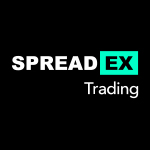
Provider: Spreadex
Verdict: Spreadex is a financial spread betting broker that has been in operation since 1999. It was founded by ex-city trader Jonathan Hufford and unlike many of its peers, it is not based in London, but instead is headquartered in St Albans Hertfordshire. Spreadex offers both financial spread betting and CFD trading from the same account. The company has some 60,000 account holders and offers access to more than 10,000 financial instruments, including UK small-cap shares, where it is something of a specialist.
61% of retail investor accounts lose money when trading CFDs with this provider
Is Spreadex a good broker?
Spreadex offer some of the best personal service for large spread betting and CFD traders and has built a reputation for great tech and trading and as such won “best spread betting broker” in the 2024 Good Money Guide Awards.
Pricing: Spreadex is super competitive and not afraid to undercut the competition
Market Access: Excellent, lots of access to exotic derivatives and smaller cap stocks
Platform & Apps: All developed in house and quick to add new features
Customer Service: Personal service is what sets Spreadex apart from other brokers
Research & Analysis: A good mix of technical indicators on the Spreadex platform and daily briefings from the financial dealing desk.
Pros
- Spread betting & CFDs
- Smaller cap stock trading
- Great customer service
Cons
- Not publically listed
- No physical investing
-
Pricing
(4.5)
-
Market Access
(4.5)
-
Online Platform
(4)
-
Customer Service
(5)
-
Research & Analysis
(4)
Overall
4.4IG: Best oil spread betting platform
Spread bets and CFDs are complex instruments and come with a high risk of losing money rapidly due to leverage. 68% of retail investor accounts lose money when trading spread bets and CFDs with this provider. You should consider whether you understand how spread bets and CFDs work, and whether you can afford to take the high risk of losing your money.
IG Won Best Trading App in the 2025 Good Money Guide Awards

Provider: IG
Verdict: IG is one of the largest and best brokers in the world and offers the full suite of investing and trading accounts for all types of investors. Highly recommended. Founded in 1974 as Investors Gold Index, then IG Index, and now just “IG”, it’s one of the world’s largest margin trading brokers. IG offers contracts for difference (CFDs), FX and spread betting (in the UK) alongside share trading and prime brokerage to over 400,000 clients, and covers 15,000 tradeable markets. IG also offers physical share dealing and smart portfolios for longer-term investors.
Spread bets and CFDs are complex instruments and come with a high risk of losing money rapidly due to leverage. 68% of retail investor accounts lose money when trading spread bets and CFDs with this provider. You should consider whether you understand how spread bets and CFDs work, and whether you can afford to take the high risk of losing your money.
Is IG a Good Trading Platform?
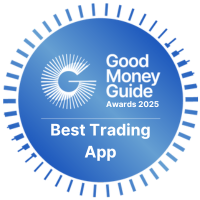 Yes, IG provides an excellent all-round trading and investing brokerage service. IG pioneered online trading and financial spread betting for private clients and remains not only one of the largest online trading platforms, but also one of the best. IG stands out through deep liquidity, high market range and excellent added value such as trading tools and analysis.
Yes, IG provides an excellent all-round trading and investing brokerage service. IG pioneered online trading and financial spread betting for private clients and remains not only one of the largest online trading platforms, but also one of the best. IG stands out through deep liquidity, high market range and excellent added value such as trading tools and analysis.
First up, I must disclose that IG is my default broker. When I review brokers, I ask: “Why would you trade here rather than at IG?” It was my first trading account – I’ve had it for about 20 years and I remember the first online trading platform when it was basically a messaging system through to the dealing desk. When I was interning on the NYMEX and IPE trading floors in London and New York as a ticket checking clerk, I’d tap away on IG on my Ericsson R380. Along with Trading Places (my dog is even called Winthorpe #notobsessed) I hold IG accountable for the path my career has taken.
Who is IG?
Stuart Wheeler, IG’s founder, basically invented financial spread betting in the attic of a Chelsea townhouse in 1974. It was first called Investors Gold Index, then IG Index and then just IG. As the product range grows, the name shortens.
His biography (Winning Against the Odds, My Life in Gambling and Politics) makes clear IG was founded for the love of the business (that business being gambling and investing).
One of the things that makes IG stand out is that it’s good at what it does, and seems to want to be the best.
I certainly gathered from my interview with the former IG CEO, June Felix, that the company wants to be on the client’s side, believing it’s better to try to help the client win, and give them good service, so they’re still a client 20 years later, rather than the churn and burn approach.
Index & Forex Trading
IG was one of the first brokers to let private individuals trade the financial markets, and IG clients can now trade a market-leading 80+ indices.
You can also trade forex on the platform. But unlike most other forex brokers, which see the largest percentage of their volumes in the forex markets, IG’s most popular asset class is indices, followed by currency trading.
Quality Service
IG has always taken the view that clients trade with it because of the service it offers, rather than because of any incentives.
No B-Book
One draw for big clients is that whilst IG does internalise orders, it has symmetrical exposure limits, so it doesn’t take a view on the markets. This means that IG is not betting against you with a B-Book. And, if you’re a big trader, because of IG’s liquidity there may actually be bigger volume on IG’s bid and offer than there is in the underlying market. You get positive slippage, so if you place a limit order and the market suddenly moves in your favour you get filled at a better price than your limit.
Spread Betting & CFD Trading
With IG you can trade CFDs or spread bet 24 hours on major indices, forex and commodities markets. There are extended hours on global equities, where some fairly significant volume goes through, particularly on US equities when company announcements are made after the main market shuts.
IG is one of the few brokers to allow trading during the weekend, so you can still take a view or limit your exposure if something big comes out politically.
IG is one of the best CFD trading platforms as it offers a huge range of markets to trade and DMA access for more sophisticated traders. Also, because IG offers CFDs globally (with the exception of the US) it has a huge amount of volume and liquidity meaning that sometimes you can place bigger orders via IG’s order book than you could do on the underlying exchanges like the LSE or NYSE. Because of the sheer volume of CFD trades, IG is able to internally match up orders for quicker and larger fills.
One key disadvantage of trading CFDs through IG is that you have to pay tax on profits. However, CFDs are not the only product that IG offers. You can also trade financial spread bets, where you do not have to pay capital gains tax on profits as this is classed as gambling.
IPO Grey Market
One feature that’s now unique to IG (lots of other brokers used to do it) is the “grey market”, where it will offer you a price in unquoted stocks that are due to come to market. You essentially take a bet on what the market cap will be of a company when it lists. Or you can just apply for shares in the IPO through PrimaryBid, which will deliver them to your IG account.
Global Differences
IG is good at knowing what customers in each region want. The UK, for example, is the only country that is offered financial spread betting, and the rest of the world trades on margin with CFDs. That’s with the exception of the Americans, who trade on margin by taking out a loan to buy stock (from their broker) or trade options, which are much more popular on equities. Japan has knockouts and Europe has barrier options and Turbos Warrants.
What Does the Trading Platform & App Look Like?
IG’s trading platform is DIY online, but still with phone support if you need it.
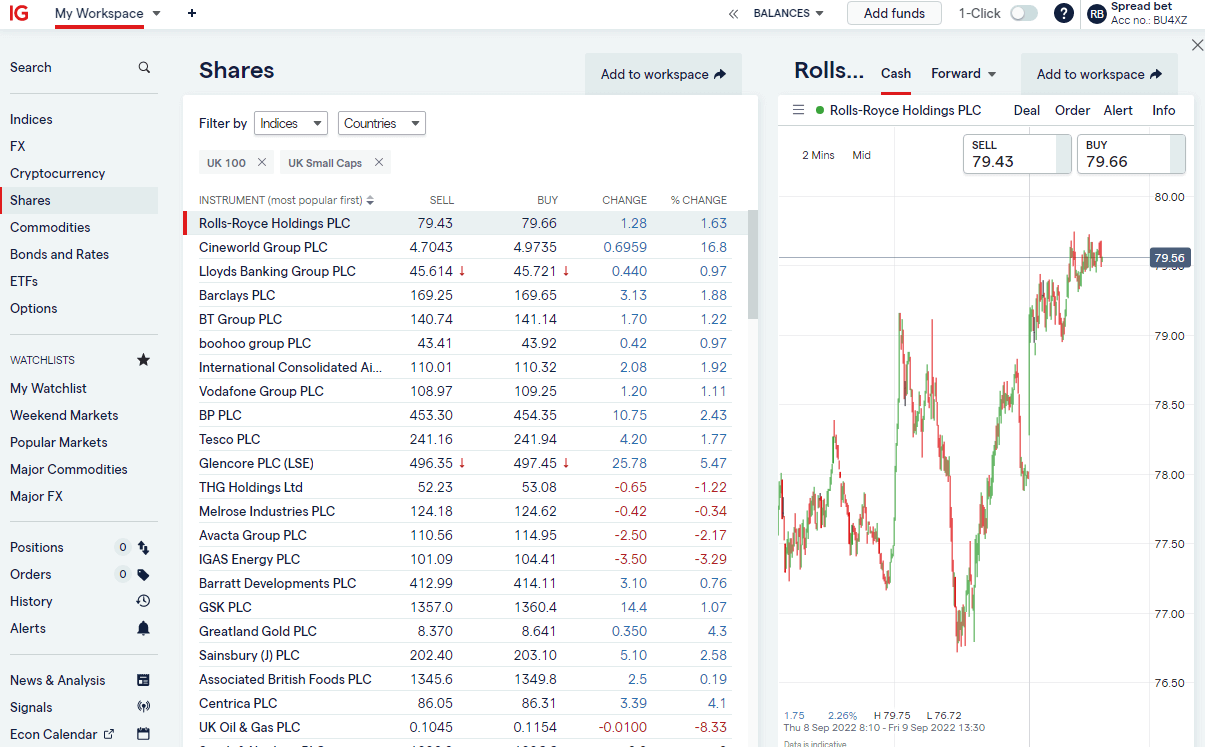
IG is keen to push its added value; the platform tries to integrate as much as possible. IGTV is based on the platform analytics of what people are trading, and IG creates programmes around what markets and assets traders are looking for information on. The news and analysis comes from Reuters, with snapshot videos and a series of IG market commentary videos.
We rate IG’s trading app as extremely safe because of IG’s regulation and reputation. However, it’s important to note that while trading on the app itself is financially secure, the products on offer are high risk and IG does offer investments that are not safe for capital preservation. IG offers financial spread betting and CFDs which are high risk, potentially high reward products.
High Net Worth Accounts
If you are a high-volume trader, you can also trade DMA with ProRealTime, and you can get level 2 pricing and trade directly on the exchange order book. This can be done on the IG trading app or by downloading the L2 dealer software. There is a cost, of course, but if you do a few trades that is rebated back. Brokers have to pay the exchanges for providing level 2 data to their clients, so the charge is there to dissuade everyone signing up without trading. If you are really clever and have developed your own trading algorithm, you can plug that into IG’s platform too. Or MT4/MT5 which it also offers, if you’re into that sort of thing.
Sticky Clients
A problem all brokers are desperate to address is people losing money. It’s always been the case that only around 20% of people made money. A few brokers have implemented post-trade analytics, to help their clients try and win more. IG’s Trade Analytics tool does just that. Its sole purpose is to try and help traders win more by getting a better understanding of where they profit and lose in the markets. It’s been developed in-house by IG, based on analytics and to provide clarity.
James Perry, a former IG Client Experience Manager, told me “We desperately want our clients to win, as the more they win, the longer they are going to be a client, and the more they are going to trade.” And the more commission IG will make.
I know this to be true from my own trading, when you’re on a winning run you trade more, and when you can’t call the market right you step away until another day.
Investing, ETFs & Share Dealing
IG also offers longer-term investing products, where you can buy and hold stocks, ETFs and funds in a stocks and shares ISA, or IG Smart Portfolio. It has a trading academy so you can learn through video and interactive courses. IG can see from its analytics that clients that use these become better traders. IG bought DAILY FX (for $40m) and offers live webinars to provide analysis and trading strategy.
You can invest and trade ETFs with IG. You have the option of either investing in the long term by buying ETFs in the general investment account, SIPP or ISA. Or you can speculate on them going up or down by going long or short via CFDs or financial spread bets.
IG is not the cheapest place for investing in ETFs, (that is probably Interactive Brokers) but it does have very good customer service and is a really easy-to-use ETF platform.
Ratings Explained
- Pricing: Industry leading spreads and with DMA you can get inside the bid/offer.
- Market Access: Best around for spread betting and CFD trading.
- Platform & Apps: Loads of added value, signals and execution features.
- Customer Service: IG is very big, but still managed to score well here.
- Research & Analysis: Superb, news, analysis, social feeds, plus free premium subscriptions for active clients.
Overall, if you are going to trade, I would be surprised if you didn’t have an account with IG.
Pros
- Vast range of markets
- Excellent liquidity & DMA equities
- Listed on the London Stock Exchange
Cons
- Customer service occasionally slow
- No DMA futures trading
- Not the cheapest for ETFs
-
Pricing
(4.5)
-
Market Access
(5)
-
Online Platform
(5)
-
Customer Service
(4)
-
Research & Analysis
(5)
Overall
4.7Interactive Brokers: Discount Oil trading & conversions
- Costs & spreads: 0.0007%
- Minimum deposit: $2,000
- Account types: CFDs, DMA, futures & options
60% of retail investor accounts lose money when trading CFDs with this provider
Interactive Brokers has a platform for everyone with very low costs

Provider: Interactive Brokers
Verdict: Interactive Brokers is an exceptional trading platform that offers institutional-grade trading capabilities to private clients around the world. IBKR has some of the lowest trading and investing fees and the widest market range in the industry. Interactive Brokers is a major US online automated electronic broker company. The financial broker is listed on the Nasdaq Exchange with ticker IBKR. The firm operates in 150 electronic exchanges in 34 countries, and offers trading in 28 currencies. Interactive Brokers has more than 3.19 million institutional and retail customers.
Is Interactive Brokers any good?
 Yes, Interactive Brokers is simply unmatched in terms of market access, account types and execution options for retail traders. It always has been and remains one of the cheapest trading and investing platforms globally.
Yes, Interactive Brokers is simply unmatched in terms of market access, account types and execution options for retail traders. It always has been and remains one of the cheapest trading and investing platforms globally.
The proof they say is in the pidding and IBKR, has increased it’s market share in the UK dramatically over the past few years. In 2024 alone, they increased the number of accounts by 142%. An amount I suspect will continue to rise, of all the brokers we cover, they provide the most updates, most platforms and are always looking to offer new markets, that investors actually want.
2025 Awards: Best Professional/DMA Broker 2025
Pricing: Top marks as IBKR don’t charge a custody (account) fee and commission are the cheapest around
Market Access: Top marks again for the widest selection of markets available
App & Platform: Hard to beat – excellent range of institutional grade execution tools and simple apps for beginners
Customer Service: IBKR let themselves down a bit here. If you are a big customer you get an account manager, otherwise online support is slow
Research & Analysis: Some of the best education, screeners and market data for free on their website and integrated into IBKR platforms.
I’ve used Interactive Brokers for about 20 years now. I’ve interviewed their founder (Thomas Peterffy), their UK MD (Gerry Perez), they’ve been a competitor (when I was a broker myself), a customer and a partner over the years. I’ve traded live with real money when thoroughly testing their platforms.
This included an in-depth conversations with their Head Of Product (Steven Sanders) to get inside insights on the best parts of the platform and services that some clients may not know about. In this review, I lay out my verdict on Interactive Brokers as an industry expert so you can decide if they are the right investing and trading platform for you.
There is one thing that Interactive Brokers gives you above all other brokers, and that is control. You can invest and trade in pretty much anything you want, in pretty much any account type, pretty much how you want.
If you are not familiar with Interactive Brokers (IBKR) they are American, but global, as most American things are, with the notable exception of their news, which always seems to be local. But I digress, IBKR was one of the first brokers to offer electronic trading to the masses. They were founded in 1978 and if you want to know more about the man who founded them and is still running the show, read my interview with Thomas Peterffy, the founder and chairman.
Highlights: The key things to focus on if you are considering opening an account with Interactive Brokers is that:
They are cheap: No other investment or trading platform can match their discount commissions, FX rates and zero account charges
Huge market range: IBKR offer by far the best access to global stock exchanges around the world
They innovate and create :You can invest in so many different ways through IBKR, from their beginner IBKR LITE apps, to their institutional-grade desktop workstation trading platform. They have some of the most advanced and easy-to-use features available to private investors.
Interactive Brokers Account Types: IBKR offer by far the most types of accounts globally including regular investing account, active trader accounts, direct market access, futures, options and fractional stock trading
You can also earn money on your cash, you can buy bonds (high and low yielding), buy warrants, partake in placings, vote on company corporate actions. You can convert currency at 0.2%, which is cheaper than most specialist currency brokers or money transfer apps.
Foreign Exchange: Which actually segues me nicely to prove my control point. With most brokers you have to choose an account base currency (if you are in the UK that is probably going to be GBP) and when you trade, no matter what currency an asset is traded in your P&L will be converted to that base currency. But with Interactive Brokers you can run your account in multiple currencies.
So, if you put in GBP and trade the S&P for example, your P&L will be in USD. If you buy USD stock you get the option to attach a currency conversion to the transaction so you can convert exactly the right amount to cover the purchase, or you can choose to run a deficit in USD.
It’s not such an issue for small traders, as currency exposure, whilst important to be aware of, isn’t the most pressing matter. But if you are running a net flat long/short global macro portfolio, then keeping on top of your currency exposure could be the difference between making money or not.
Desktop Trader: Through ScaleTrader, (one of the founder’s favourite features) IBKR also gives you some very advanced order functionality, the sort you usually only get with professional trading systems like Fidessa (for stocks) or TT (for futures).
If you’re building a big position and don’t want the market to know you’ve got a big order to work, IBKR’s order ticket will let you gradually feed that into the market (but only charge you for the single order).
You can automatically drop bids and offers into the market based on time and price to take advantage of volatile markets. You can also set it to scalp for quick profits in choppy markets.
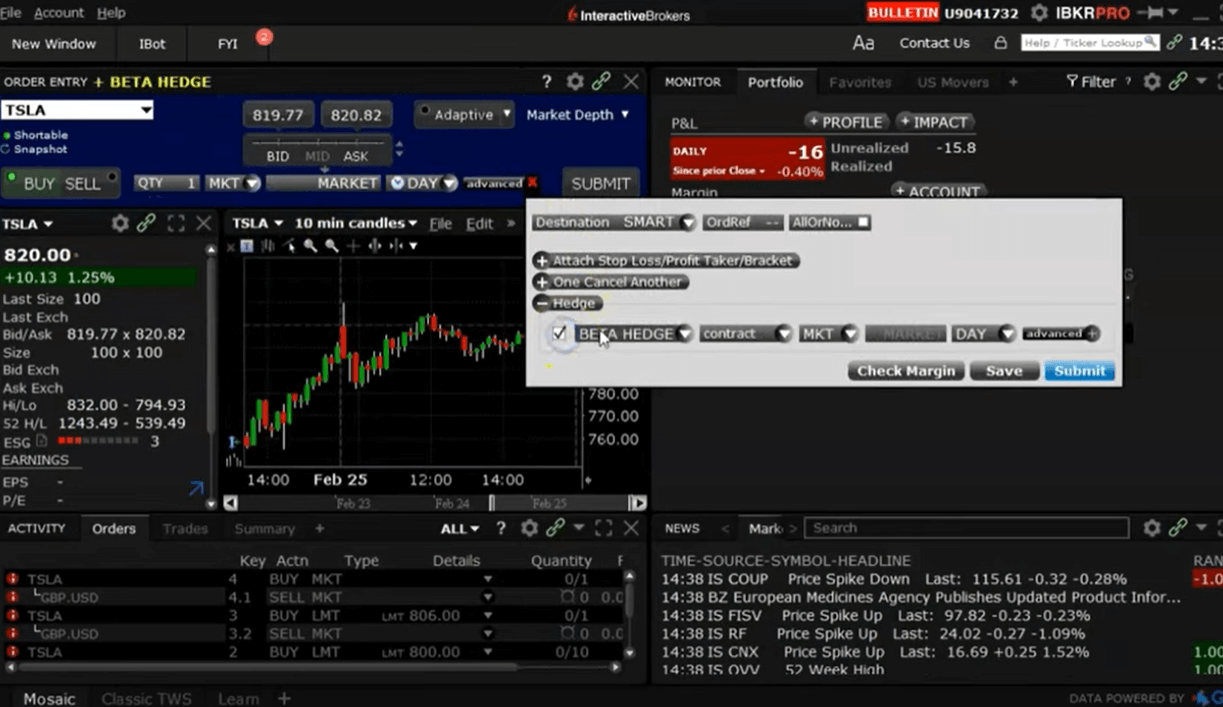
Pairs Trading: You can trade one stock against another automatically by spread, percentage or price.
Why is that important? Because it can help you build a market-neutral portfolio and when we asked the boss of IBKR the habits he saw in his most profitable customers, (referring back to our interview with him for the third time) he said the ones that traded one stock against another, often did well.
Interactive Brokers Universal Account: You can of course do these things with other brokers, but what you can’t do is do them all in one place.
For this review, I spent a while talking to Steven Sanders, IBKR’s head of Marketing & Product Development, and he said in the twenty years, he’s worked for Interactive Brokers the thing he’s most proud of (other than it being founder lead and therefore very little red tape when you want to get things done) is the implementation of the Universal Account, where everything is done from one account.
What’s amazing to me is that nobody else really offers it. Ten years ago when I was a derivatives broker at Man Financial, we offered everything that IBKR did, but all on separate platforms. We have a couple of big accounts, £20m upwards, that we were always trying to lure back from IBKR with our personalised voice brokerage where you could phone us up we’d take care of your complicated orders for you.
But times change, there is still demand for bespoke voice brokerage, but not as far as Interactive Brokers are concerned. They do offer it from specialists desks if needed, but most trading and investing is done online.
Demo Account: Interactive Brokers does have a demo account, but they call it a free trial instead. This is odd, because you don’t actually have to pay to have an account with IBKR. In fact, Interactive Brokers is one of the only trading platforms that does not have a custody fee for investing in a GIA, SIPP and ISA.
If you want to know more about that, you can listen to my podcast with Gerry Perez, the UK MD, who explains, how they offer such amazing market access for such little cost.
You get a cool $1m to paper trade with on the Interactive Brokers demo account or ‘Paper Trading version’ as they call it. You get access to the easy-to-use investors portal and the more complex IBKR TWS provides delayed market data, simulated trading and access to all of our unique tools and offerings, including the IBKR Risk Navigator, the Volatility and Probability Labs, Portfolio Builder, Research and News.
But, to be honest, I didn’t find the demo account very good. Lots of information was missing and I couldn’t place a trade. I’m not sure why, and actually, that’s going to be a bit of an issue for Interactive Brokers because demo accounts are a great way to get client’s interest. In a world where so many brokerages a vying for the same business, even small hiccups like that can cause a massive drop off rate in opening an account.
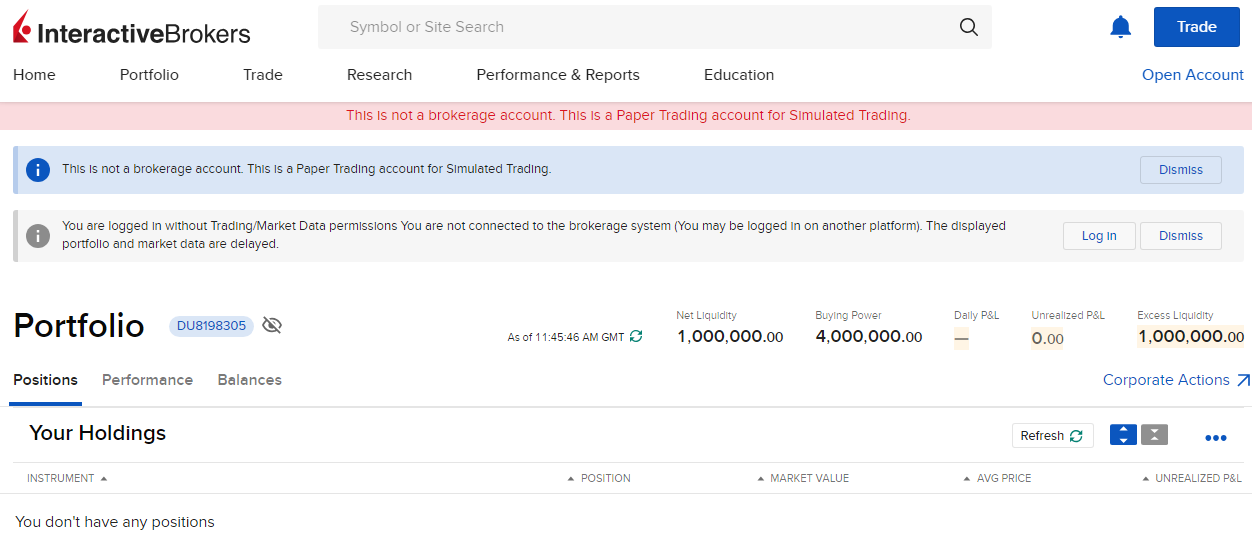
Usually, IBKR’s technology is first-rate, but the demo account isn’t up to scratch. I didn’t use the paper trading account, just the live trading platform with real market orders.
Customer Service At Interactive Brokers: It’s not all great, it takes a while to get through on the phone to customer service, and it has a slightly outsourced feel about it (if you know what I mean).
The desktop trading platform, despite its exceptional functionality, is also a bit ‘Windows 95’. But if you don’t need all the bells and whistles, the web based platform, or app has a more modern feel to them.
Options Strategy Builder: Options trading is gaining in popularity in the UK, mainly because of the press attention they derived from meme stocks (where US traders punt via options). But they are still a very complicated product. So what Interactive Brokers has down is create a Strategy Builder product, that essentially reverse the process of putting on options strategy trades.
You tell Strategy Builder what you think the market is going to do. For example, either, go up, stay still, not move for a while, or volatility will increase and it will create an options strategy around that. Instead of you having to know what strategy to put in place or working out the individual options legs.
IMPACT Ethical Investing: In tune with moving with the times, Interactive Brokers has also released the IMPACT app to help people investing in ESG and impact sectors, so they can put their money to good.
You can see the IMPACT dashboard on desktop, but it also operates as a standalone app that connects directly to your IBKR account and scores your portfolio based on how ethical the stocks you hold in it are. Ratings come from FactSet and Refinitiv, and there is this excellent feature that allows you to swap into more ethical stocks.
If one of your holdings is flagged as not that ethical, the app will suggest another one and at the click of a button, it will sell your shares and calculate how many new shares of a more ethical but similar company to buy and do it all for you. If you’re in the US, you can also make charitable donations directly on the app.
Interactive Brokers For Beginners: There is no doubt that Interactive Brokers is a proper trading platform, for those who know what they are doing and cater mainly to the more sophisticated investor. But they are making an effort to open their services up to the newer breed of investor and trader.
It’s standard now among many fintechs, but IBKR were actually the first to offer no commission trading. They also offer fractional shares through IBKR LITE and IBKR Pro accounts and have removed the monthly minimum account charge.
The hope of course is that by onboarding investors when they just start, they can look after their investments for the next 40 years, just as they have been doing for their existing clients for the last 40.
Interactive Brokers runs a Student Trading Lab where students from 600 schools and universities take part in a $1m paper trading account for the purposes of getting a better understanding of the markets. No broker these days can tell you what to buy or sell, but IBKR GlobalAnalyst helps you hunt out undervalued opportunities, across the world, not just in the US.
IBKR offer a Trading Academy, podcasts, webinars and blogs for beginners and experienced traders so that new customers survive the markets to become long-term clients.
Plus, they are cheap.
24-Hour ETFs At Interactive Brokers:Interactive Brokers has a list of 24 selected ETFs available to trade around the clock from Sunday evening, east coast time, through to the close on Friday, by adding these funds to its US overnight trading facility.
Clients who are permissioned to deal in US stocks, are able to trade these ETFs 23.50 hours a day, five days per week, allowing them to react to news stories, macroeconomic and geo-political events as they happen, rather than waiting for US markets to open.
The trading hours and ETFs are available to both retail and institutional clients alike and are traded via the firm’s IBEOS system. Trades can be submitted using multiple order types.
The range of ETFs is pretty broad and includes firm favourites such as SPY, QQQ, DIA and IWM, which track the S&P 500, Nasdaq 100, Dow 30 and Russell 2000 indices respectively. You can also short those indices by trading the SH, PSQ, DOG, and RWM inverse ETFs.
Pros
- Very low dealing fees
- Wide market range
- Direct market access
- Complex order types
Cons
- Customer services can be slow
- No financial spread betting
-
Pricing
(5)
-
Market Access
(5)
-
Apps & Platform
(5)
-
Customer Service
(4)
-
Research & Analysis
(5)
Overall
4.8CMC Markets: High-tech Oil trading platform
- Costs & spreads: 0.3
- Minimum deposit: £1
- Account types: CFDs & spread betting
74% of retail investor accounts lose money when trading CFDs with this provider
CMC Markets Review: Great Tech for Active Traders

Provider: CMC Markets
Verdict: CMC Markets is one of the best and fastest trading platforms available for active traders to speculate on the most popular markets. The company is one of the original spread betting and CFD brokers based in the UK. It’s been providing forex trading services since 1989 and is now listed on the London Stock Exchange. The broker has over 300,000 active clients trading online and is operated from 13 global offices, with headquarters in the City of London.
64% of retail investor accounts lose money when trading CFDs with this provider
Is CMC Markets a Good Broker?
Yes, CMC Markets has always offered, and still offers, one of the best trading platforms for high-frequency and active traders. It’s a good choice for those who want to trade on tight spreads, with a platform built on exceptional tech.
I’ve used CMC Markets for 20 years now and it’s typically been my go-to broker for trading forex and equity sectors.
I recently gave it another full test with real money and live trades. I’ve also interviewed its founder and its head of product. In this review, I share my views on what CMC Markets is good at, where it needs to improve and which types of trader it suits.
Almost 20 years ago, when I first had my account, I remember sitting in CMC’s reception, eager to pick up a CD-ROM of the Market Maker trading platform so I could trade personal account when I was a stockbroker at Phillip Securities.
I used to flit between using IG and CMC Markets back then. IG had a few more markets, but the platform was a bit basic. CMC Markets had tighter pricing and because the platform had a dark background, and more flashing lights you felt like a real pro. Despite the fact that CMC’s heritage is in the FX markets, I could never really get the hang of those so I’d trade indices, and FTSE 100 shares (also, CMC only really did the main market stuff back then).
I could have waited for CMC to post me a disc, but I had a real itch to try it out. It was an excellent trading platform then, and it still is today.
What Does the Platform Look Like?
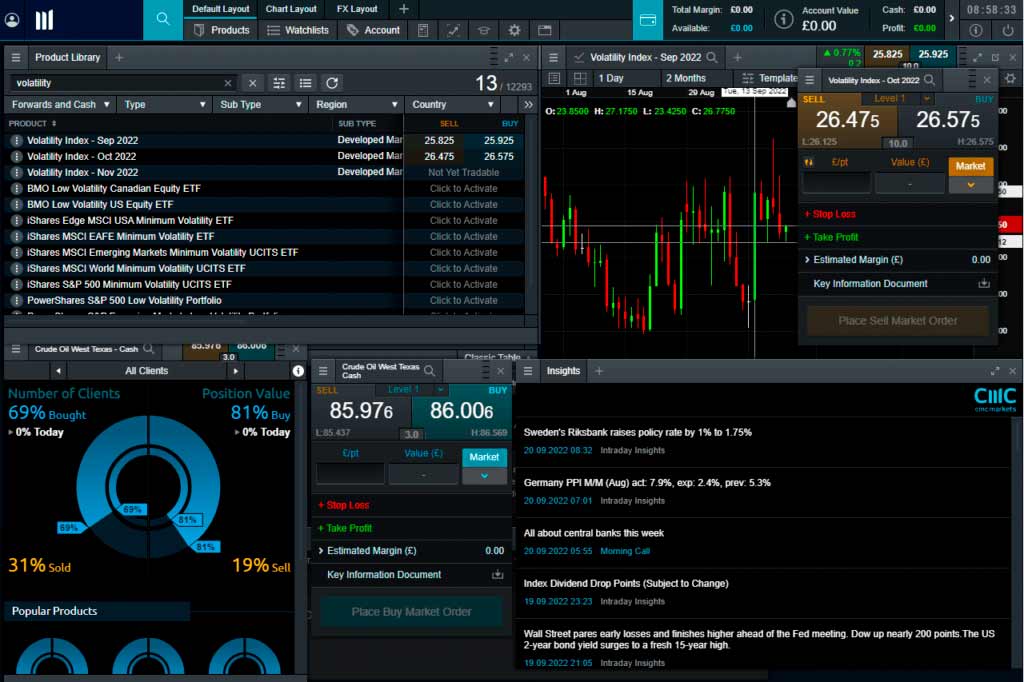
History Of CMC
The current CEO, Peter Cruddas, set up CMC as Currency Management Corporation in 1989 after leaving Western Union, where he learned how the foreign exchange markets worked, in particular the market-making side of the business. Originally offering forex trading, then financial spread betting and moving into CFD broking in 2000, CMC began to expand internationally in 2002. CMC Markets was listed on the London Stock Exchange in 2016.
CMC Markets, which is now a member of the FTSE 250 index, has over 310,000 active clients globally, and in the 2023-24 financial year generated a net operating income of £332.8 million.
When I visited the CMC offices a few years ago, the brokerage world was switching from voice to online. CMC was one of the first forex brokers to invest heavily in technology and has always led the way in online trading platform innovation.
CMC Markets: Spread Betting & CFDs
CMC Markets only offers CFD trading, rolling spot forex and spread betting in the UK. These are generally short-term speculative products. You can invest in the long term and buy physical shares through CMC Invest in the UK (although in Australia CMC Markets does offer stockbroking).
If you don’t know what these are you shouldn’t be trading them. But if you do and you want to trade them, CMC Markets is in my view one of the best places to do so. In 2024, the platform came up with a nice tagline…
Calling all calculated risk takers…
This is the essence of trading, really. Yes, trading is risky, but it’s a calculated risk. And one way to reduce risk is to go with a well-established and well-capitalised provider. CMC Markets is a public company so you can see how well it’s doing as a business. Trading is hard enough without having to worry if your broker is going to go bust. In the UK, retail client money is held in segregated client bank accounts, in a regulated bank.
CMCX Share Price
The current CMC Markets (LON:CMCX) share price is 326.03p which is a change of 1.03 or 0.32% from the last closing price of 325 with 100,014 shares traded giving CMC Markets a market capitalisation of £912,270,958. The most recent daily high has been 329.5 and daily low 312.5. The CMC Markets share price 52 week high has been 339 and the 52 week low 183.4. Based on the most recent CMC Markets share price opening of 326.03, the current CMC Markets EPS (earnings per share) are 0.23 and the PE (price earnings ratio) is 14.19. Pricing data automatically updates every 15 minutes, last updated: 16:47 26-Feb-2026.
Although you’re out of luck if you want to trade CMC shares on CMC, I tried when I was demonstrating how to do a pairs trade against its main rival IG. I had to trade CMC on IG and IG on CMC.
Market Range
CMC Markets definitely has one of the best market ranges of all brokers. Although it doesn’t offer all shares – around 12,000 assets vs IG’s 17,000 or Interactive Brokers’ epic coverage – it has some really great markets that are exclusive to CMC. I’ve always used it for trading the most popular shares, and I would say it’s aimed at active traders more than its rivals. You only really miss out on smaller cap stocks that aren’t appropriate for margin trading anyway, as they are growth investments.
CMC Markets Sector Bets & Diversification
One of the things that I’ve always liked about CMC is its approach to diversification. Everyone knows that you shouldn’t put all your eggs in one basket when it comes to investing, and the same is true of trading. You’ve got a better chance of beating the market consistently if you spread your risk across different asset classes and don’t go crazy Rio trading.
I find forex trading incredibly difficult. I’ve never been able to make any money at it because I can’t judge forex price action – I find it too fast-paced. What I like to speculate on is the overvaluation or undervaluation of one currency against another.
CMC has a market called weighted currency indices, which basket together one currency against many others. So you can trade how you think USD is going to perform against the EUR, GBP, AUD, CAD, CHF, CNH, JPY and SGD in one go. So instead of an outright punt, you are taking on a dollar position rather than a USD-GBP trade.
What Does the Forex Section Look Like?
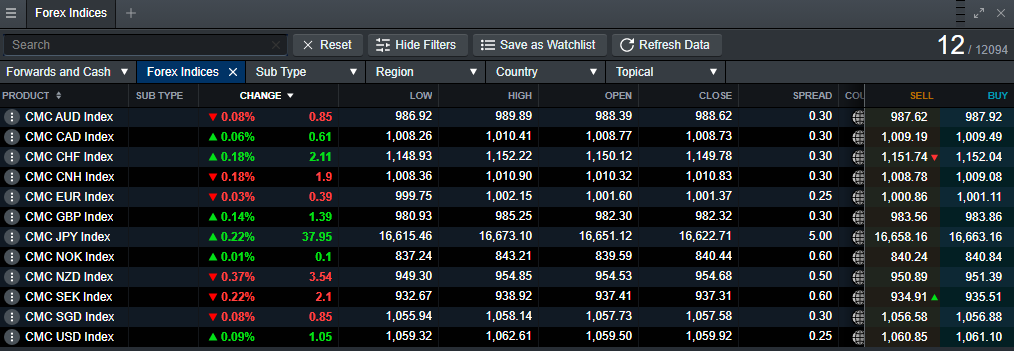
Share Baskets
CMC Markets has always enabled sector bets, but it has fine-tuned these over the years because of the proliferation of ETFs into share baskets, like US Gold, Oil & Gas, Luxury Lifestyle and Collaborative Technology. This is great, because I really like trading stocks. I find this quite easy compared to forex as stocks are based on fundamentals I understand.
One trading strategy that is relatively simple is trend following, especially now with the Reddit generation getting so worked up. If you see a sector getting some good press you can jump on the bandwagon without having to sniff out the individual stocks. Likewise, if sentiment is turning negative, it may be time to go short.
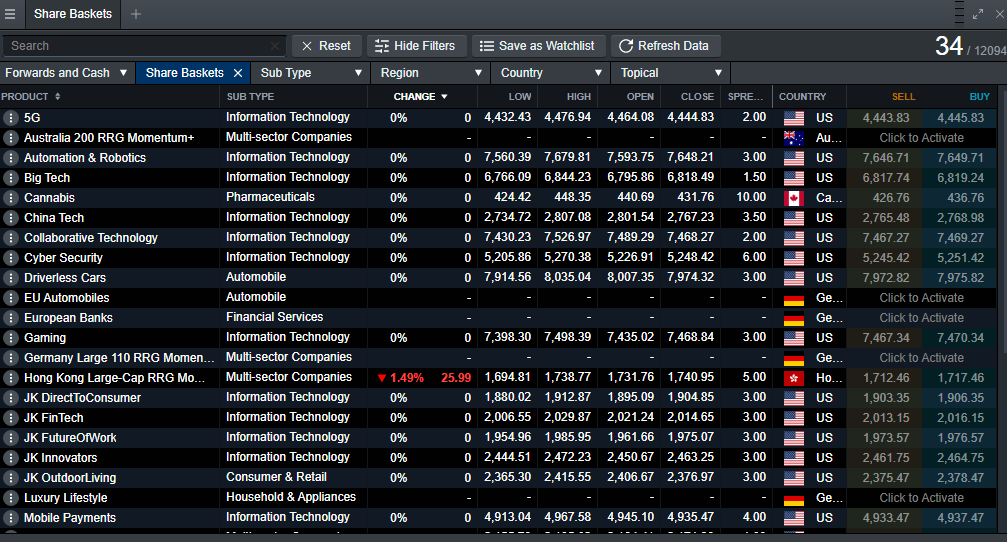
Deal4Free
Did you know that CMC Markets was once called Deal4Free? You obviously can’t say that anything is free now, because the regulators frown on that sort of thing. Instead, you have to say something like “zero commission”, because you’re being charged something somewhere – you just don’t see it on your statement.
Trading with CMC Markets is obviously not free, but it is cheap. It has always been one of the best value trading platforms, primarily because it unashamedly acts as a market maker.
If you are spread betting, charges are built into the spread and are competitive. It’s always been part of the appeal that if you are trading the most popular and liquid assets, CMC is one of the cheapest places to do it. Commission charges on single stock CFDs are set at 2 cents per share in the US (minimum $10) and 0.10% for UK and European equities (minimum of £9/€9). So you get the choice. If you are a normal trader you can have your costs built into the spread, or if you are one of the bigger boys you can trade CFDs with better pricing and commission charged afterwards.
Alpha & Price Plus
There are two ways to get recognition at CMC. Firstly, you can buy your way in with a minimum deposit of £25,000 and join its premium membership, Alpha. It’s a nice name because, as I’m sure you know, an alpha in trading is trying to outperform the market. You get interest on cash balances and discounted spreads. There’s also a free subscription – it was to the FT but is now to Bloomberg.
If you can’t afford to buy your way in, you can still get reduced spreads by putting the volume through. The more you trade the lower your spreads will be…
CMC: Profitable Client Sentiment
CMC offers users access to client sentiment and positioning tools that show the aggregate positioning of its customers in various instruments. The data includes long-short percentages by clients and value as well as a breakdown of the current day’s order flow. Once again, this is broken down by both client percentage and value. What’s more, you can filter the positioning sentiment by client type, segmenting the data into top clients and other clients.
The top clients view shows the positioning, in a particular instrument, of those clients who have made money on their trading account in the last 3 months, and who have an open position in the instrument under observation.
The ability to filter the sentiment and positioning by client type gives CMC clients a potential advantage over peers who don’t get this additional insight.
Positioning and sentiment data can be used to trade, though how you use it will be determined by your outlook on the markets. Experienced traders take the view that as the majority of CFD and spread betting clients lose money it follows that positioning data is a reverse indicator, especially when the clients seem to be opposing an established trend.
In these days of social trading and large crowds, however, that may not always be the case. On balance it’s probably best to think of sentiment and positioning gauges as decision or trade support tools, rather than decision-makers in their own right.
CMC Markets: Education & Analysis
CMC has plenty of education and analysis available for its clients. It’s divided into separate sections: current news and analysis, a section on learning to trade that covers FX, CFDs and spread betting, and equities trading.
As well as technical analysis, CMC offers trading from home and trading strategies.
CMC Markets also offers what it calls market intelligence through its specialist website OPTO, which includes a magazine full of insightful articles, plus podcasts, and interviews with high-profile guests from the markets.
The trading guides are aimed at beginners and less experienced traders whereas OPTO is for more experienced traders who are looking for fresh ideas and inspiration. News and analysis from CMC’s in-house analysis team sits comfortably between them, and as we noted earlier, there is also an online moderated charting community within the trading platform.
All of this is available at no additional charge and much of it is available to the public as well as CMC clients. Many of the major providers have a general education program and support their traders with news and in-house analysis. But OPTO stands out from the crowd and, to my mind, this elevates the CMC offering above the competition.
CMC Markets offers an investment option with CMC Invest.
Institutional Prime Services (CMC Connect)
Recently rebranded to CMC Connect, the institutional side of the business is where CMC expects to grow over the next 5 to 10 years. The company has high profile joint ventures such as the stockbroking services it provides to the clients of ANZ Bank. Alongside these partnerships, it offers institutional liquidity, outsourced trading technology and connectivity, as well as pre and post-trade processing and trade reporting.
These services are aimed at institutional customers such as hedge funds, family offices and prop traders. HNWI and the most active professional clients might be able to use some of CMC Connect’s services but the division is really aimed at corporate customers and funds.
CMC competes with all of the large-scale margin trading brokerages in the CFD, FX and spread betting arenas. It’s also making inroads into the institutional and B2B spaces through liquidity provision, white labels, and JVs. That push on the institutional side and the firm’s focus on in-house trading technology, and the use of currency and share baskets, are the key differentiators from its competitors.
CMC Markets Review Ratings Explained
- Pricing. It used to be called Deal4Free, and pricing is still good…
- Market Access. CMC focuses on the main markets, but still offers many exotic pairs to trade
- Platform & Apps. CMC Markets has some of the best trading tech around for active traders
- Customer Service. London-based support staff (still thankfully, despite all the Brexit pomp)
- Research & Analysis. Top class client sentiment tools
Pros
- Excellent trading platform
- Good liquidity
- Unique sentiment tools
Cons
- Trading only (investing is on CMC Invest)
- Limited smaller cap stocks
-
Pricing
(5)
-
Market Access
(4)
-
Online Platform
(5)
-
Customer Service
(4)
-
Research & Analysis
(5)
Overall
4.6Saxo Markets: Best oil futures trading & ETF platform
- Costs & spreads: 0.28
- Minimum deposit: £500
- Account types: CFDs, futures & options
70% of retail investor accounts lose money when trading CFDs with this provider
Saxo have some of the best trading and investing platforms for advanced and beginner investors
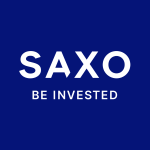
Provider: Saxo
Verdict: Saxo is an excellent investing and trading platform for those that who want institutional grade pricing, robust execution and wide market coverage as well as simple to use apps for beginners.
62% of retail investor accounts lose money when trading CFDs with this provider
Is Saxo Markets a good broker?
Yes, Saxo has a great choice of accounts for beginners with SaxoInvestor and for professionals, the more sophisticated SaxoTrader go provides direct market access. The pro platform, analysis, and direct market access may be too complicated for beginners. But, for experienced traders, its coverage, commissions and research are unrivalled.
Saxo is one of the largest investing and trading platforms worldwide and provides direct market access to equities, bonds, forex, futures and options as well as being a major liquidity and infrastructure provider to wealth managers, banks and smaller brokers.
Awards: Saxo won best investing app and best DMA/Professional account in 2024. Before that, in our 2023 awards, Saxo won ‘Best CFD Broker’, and ‘Best DMA & Professional Trading Account’. In 2022 Saxo also scooped ‘Best Bond Broker’.
Pricing: Commissions have just been reduced further making Saxo one of the cheapest brokers
Market Access: Saxo offers a huge range of markets for both derivatives trading and physical investing
Platform & Apps: Saxo has an industry-leading robust workhorse of a platform
Customer Service: Experienced dealers for active larger customers
Research & Analysis: Some of the best opinions on the markets around.
Plus, with Saxo posting its best financial results in history (with over $118bn customer funds on account) and now that it has been 70% bought out by J. Safra Sarasin Group, they will be in an even better position to continue to provide excellent market access. This, combined with founder Kim Fournais still owning 28% will keep the firm’s customer-first ethos intact.
Overall, Saxo Markets is an excellent trading platform for retail traders and investors who want institutional-grade pricing, robust execution and wide market coverage.
Pros
- Direct market access
- Low commissions
- Robust trading platform
Cons
- Seen as a trading platform for professionals
- Have to subscribe for live prices
-
Pricing
(4.5)
-
Market Access
(5)
-
Online Platform
(5)
-
Customer Service
(5)
-
Research & Analysis
(5)
Overall
4.9XTB: Good Oil trading educational material
- Costs & spreads: 0.3
- Minimum deposit: £1
- Equity overnight financing: -0.02341% / -0.00159% DAILY
- Account types: CFDs
81% of retail investor accounts lose money when trading CFDs with this provider
XTB Review: A Great All Round Trading & Investing Platform

Provider: XTB
Verdict: XTB is a CFD and forex broker headquartered in Poland and listed on the Warsaw Stock Exchange (WSE:XTB) valued at over $1bn. XTB was founded in 2003 and offers forex, indices, commodities, ETF and stock CFD trading. XTB has historically used celebrity endorsements to promote it’s brand including Jose Mourinho, Conor McGregor, Joanna Jędrzejczyk and Jiří Procházka.
72% of retail investor accounts lose money when trading CFDs with this provider
Is XTB a good broker?
XTB, are a decent all-round trading platform and a good choice for most small-to-medium sized CFD traders. They are publically listed in Poland and offer, competitive spreads on a fairly wide range of markets.
The key things to focus on when considering trading with XTB are:
- They have their own proprietary trading platform. When I interviewed Omar Arnaout, the XTB CEO Omar Arnout, he said “I’m really proud of our platform and honestly believe it’s one of the best in the market.” Rightly so.
- They really push client education, XTB won “Best Trading Platform Education” in our 2023 awards (although they didn’t show up to collect the trophy, they never do). You can read their Q&A on forex education here.
- Customer service is paramount. Omar said that “first and foremost is the customer service”. I really agree with this as I think it’s important to have a few different trading accounts (diversify, diversify, diversify) and you’ll trade more with the broker that treats you best.
Pros
- Publically listed
- Mulitple platform choices
- Innovative order types
Cons
- Not UK based
- No DMA
-
Pricing
(4)
-
Market Access
(4)
-
Online Platform
(4)
-
Customer Service
(4)
-
Research & Analysis
(4)
Overall
4eToro: Copy other people’s Oil trading
61% of retail investor accounts lose money when trading CFDs with this provider. You should consider whether you can afford to take the high risk of losing your money
eToro Has Become One Of The Biggest & Most Innovative Brokers Around The World

Provider: eToro
Verdict: eToro is a social trading platform that lets their users share new and existing CFD positions and their investment portfolios. eToro was founded in 2007 in Tel Aviv, Isreal and has grown to offer investing and trading on 3,000 global assets (including real cryptocurrencies) to 30 millions users worldwide.
61% of retail investor accounts lose money when trading CFDs with this provider. You should consider whether you can afford to take the high risk of losing your money
Is eToro a good broker?
Yes, eToro does have its flaws for experienced investors, but if you are just getting started eToro is a great introduction to financial markets. eToro is actually a very innovative trading platform offering copy trading, social networking and unleveraged CFDs.
eToro is one of the most innovative trading platforms with a huge range of popular investors to follow and good access to global stocks and cryptocurrency.
- Pricing: Even though eToro is commission free there are high FX conversion fees between 1.5% and 3%. Overnight financing is also expensive for CFD positions compared to competitors.
- Market Access: For the majority of investors you can trade the most popular markets, but lacks access to small-cap stocks and exotic derivatives.
- Platform & Apps: Very good, nearly gets top marks for intuitiveness, but misses out because of no sophisticated order types
- Customer Service: No phone number available to non-premium clients, but generally quick responses to chat and email queries.
- Research & Analysis: A mixed bag here – some good social investing fees on the platform and digestible guides, but no direct actionable research.
Is eToro better for trading or investing?
Ever since I sat in The Angle pub, next to the Silicon Roundabout opposite where I was a stockbroker (at Walker Cripps Weddle Beck) 15 years ago discussing the merits of eToro as a forex broker, I’ve been fascinated with their journey. I’ve interviewed the founder, the UK MD and watched (despite the industry’s loathing) as they have shrugged off the masquerade of day trading, into becoming a global investment platform sensation. In this review, I’ve tested them year after year and pontificated on what sort of customer should be using them.
In the past, I’ve been very rude about eToro, I didn’t like the way they’d gamified trading and along with Plus 500, they almost made it too easy for inexperienced traders to play the markets.
But are times changing?
Social & Copy Trading
A while ago, we published an interview with the founder of eToro Yoni Assai, about whether or not copy trading could be a challenger to traditional fund management. Copy trading is not new, it’s been around for years, whereby investors will copy the positions of an amateur trader in the hope of making money.
I first came across the concept about 15 years ago, when traders would follow futures traders on Strategy Runner. This of course was for professional regulated advisors to make it easier to have a wider client base and helped with execution allocations. The Strategy Runner technology was later bought by MF Global before its demise. Then came MT4, again, focussing on high-risk markets, like forex and index trading.
But one thing these platforms lacked was a community.
Trading Communities
This is odd because the trading and investing community is one of the most focal out there. There are some hilarious bad pontificators and some very good ones across the entire investment landscape. Seeking Alpha, has some excellent lay contributors looking at stock fundamentals. LSE.co.uk (“London South East” and absolutely no relation to the London Stock Exchange) still have a vibrant community of share chat for UK small-cap stocks. Reddit, has it’s meme’s for pump and dump schemes, and even Saxo Markets, the professional trading platform, tried to introduce a social network for traders called tradingfloor.com where you could link your trading account and see and copy other traders. Covestor tried the concept for stocks in the US, but couldn’t make it work.
One very interesting aspect of eToro’s social trading offering is that they now have a huge amount of data from a broad range of successful investors and traders. They have packed this all together into something they call the GainersQTR smart portfolio which aggregates the investments of the best popular investors on the platform.
But eToro keeps on going from strength to strength. So what is the appeal and why do they have over 20 million users and growing?
Investing for growth
The first thing eToro is keen to point out, when I spoke to the newly appointed UK MD, Dan Moczulski, is that eToro is not a trading platform anymore, they want to be an investing platform. I’ve known Dan for years, he knows the markets and the technology inside out and is well respected within the industry. So I spent an hour with Dan on Zoom, whilst he explained what eToro was all about and where they want to go.
When you execute a trade, unlike other trading platforms where max leverage is automatically given, the default leverage setting on stocks is zero, you can opt for more if you want. However, even though eToro buys the stock in the underlying market, you don’t get voting rights, can’t transfer the stock out, but you do receive your entire dividend entitlement (after it’s been taxed at source). For index and forex trading, though it reverts to form and leverage is set at 20x for indices like the FTSE and 30x for Forex pairs like EURUSD.
Day trading
eToro is not very good for day trading. For a few reaons, the main one being they don’t want to be. My mate Dan, the UK eToro MD told me that they want to be an investing platform rather than a trading platform. He was actually quite put out that we’d included eToro in the trading section, rather than the investing category.
But, whilst I still think there are better options for longer-term investors (although their copy trading track record is doing very well), I don’t think eToro is any good for day trading. There isn’t enough order functionality like, algos, DMA, OCOs, or even limit entry orders. Prices, even though they mimic the bid/offer cannot be tightened up with DMA access. Yes, there is an opportunity to take intra-day positions on indices and forex pairs, but it just doesn’t “feel” like a day trading platform to me.
Brokers like IG, CMC Markets, and City Index are much better for short-term trading. You can compare what we think are the best day trading platforms here, and see how eToro fits in.
Diversfication
But they say, that what they are actually trying to promote is diversification in portfolios by giving new investors the tools to explore the markets. One way they try and do this is through fractional shares and the way people buy stocks. They say they want to give people the opporuntiy to buy lots of little amounts of lots of different stocks (encouraging diversification), If you have £1,000 to invest, you can buy £100 of 10 shares instead of having to figure out how many shares of company A, B & C equates to £100, if at all.
Recurring orders
eToro have just introduced these and it’s been a long time coming. Being able to set up regular buy orders is a really power tool for beginner investors as it forces you to create good investing habits. One of the best ways to invest is little and often when you can afford it. So you can set up regular orders just after you get paid, which means that you are always allocating money to the market. You also benefit from reduced FX conversion fees (0.75%), which means itis actually cheaper for you to invest automatically than to do it yourself.
USD account balances
One thing though, that has always irked me about eToro and one of the reasons I’ve classified it as a trading platform rather than investing account is that all trades are settled in USD. In my mind, they fall at the first hurdle as an investment platform, because, how can you have an investing account where you don’t actually own stocks, you can’t invest in an ISA, there are no SIPPs and you are hit with dreaded foreign exchange fees on every trade you make. All those things are key to an investment account.
But, Dan was quite keen to explain why this was the case. It’s a one size fits all solution. If they want to offer free trading, they have to keep things as simple as possible and using USD as a default currency solves two issues.
One, USD is a global currency and most of the trades on the platforms would be settled in USD anyway, even in the UK.
Does zero commission equal zero costs?
The second issue is how they make money when they have zero commission. eToro makes money on foreign exchange (roughly 0.5% per trade) and they make money from withdrawal fees. There are also some stocks that are not zero commission and CFDs are exempt where eToro makes money on the bid/offer spread. Zero commission may be a loss leader of sorts in the UK, as whilst they earn 0.5% in conversion fees, they lose
As an eToro trader you used to be able to offset that FX charge, because if you ought UK shares, you were not charged stamp duty. But eToro has recently announced that they will no longer be absorbing the stamp duty tax. eToro said they absorbed this as part of their simplicity and low-cost model. But unfortunately, that is no longer the case.
Essentially, you get what you pay for and if you want all this for free you have to compromise on something, which is everything being dealt in USD.
38 Million Users
Perhaps, eToro’s most valuable asset is its client base. 38 million users, all with differing opinions and sentiment. Afterall, that’s what makes market. Opinion, it drives buy and it drives sellers. When more people buy the market goes up, and viceversa.
eToro has built a community of almost 20 million accounts, traders or investors. And when you open up the platform it definitely has more of a social media platform instead of a trading platform.
There are two types of community.
The first is the opinion-based, where the feed is populated with the latest views from eToro clients.
The second is copy trading. You can copy anyone you want (as long as their account settings permit it). Or you can copy what eToro call “Popular Investors”, these are investors who have applied to join eToro’s copytrader platform and aim to earn money from it.
Popular investors
Popular investors can earn up to 1.5% of AUC (assets under copy), or however much money other investors on the platform have chosen to allocate to copy their portfolios. However, eToro is keen to point out that once you have $15,000 copying your trades, you are vetted (not endorsed) by eToro and have to stick within risk parameters. Otherwise it would become a scammers paradise.
The thing about investing is that it’s actually quite easy, any fund manager will tell you that the key is to do your research, buy some good stocks, and then do nothing for a very long time. So as long as you do your research and pick some good investors to follow, who are following the same principle then you “should be ok”. BUT, fund managers have oversight, they have compliance officers and risk committees, so they can’t just change their mind about how and what they invest in. Of course, with some notable exceptions, cough, cough Woodford.
When you look at a potential trader to copy, you can see their trading history, their risk parameters and also what they are invested in. Which if nothing else is a good place to start building a portfolio, because you can see where the best performing investors are putting their money. Which is actually a good strategy in the fund management world as well. Morningstar for instance shows the top ten holdings a fund holds. Take a look at Blue Whale for example, you can see what they are invested in and either copy them by buying the fund, or just buy the top ten stocks they hold in your own investment account. If you want to know how fund managers actually invest we have a couple of good interviews with Stephen Yui from Blue Whale and Jamie Ross from Henderson.
If you don’t know which unregulated amateur traders to follow, you have the option to buy a portfolio of aggregated “Popular Investors” diversifying your risk further, or can opt for a smart portfolio that has been put together by a professional investment firm.
Or if you want exposure to sectors there are Thematic funds, like, for instance, if you want to invest in the Metaverse, which is a hot topic right now. eToro have a selection of what they call Smart Portfolios, where they have selected stocks relevant to sectors, a bit like buying ETFs. So if you want to invest in the Metaverse, but don’t know where to start the MetaverseLife Smart Portfolio contains a basket of stocks and crypto that has exposure to the Metaverse.
Cryptocurrency
This brings me quite nicely onto Cryptocurrencies. In the UK Crypto derivatives are banned by the FCA for retail traders. If you want to invest in cryptocurrency in the UK you either have to be classified as a professional trader, or by them on a crypto-exchange or platform like eToro on a fully paid-up basis.
One thing eToro has always been really good at is being first to market with new assets, they offer quite a wide variety of cryptos compared to other regulated fintechs, but also vet which cryptos they add by demand, liquidity, the tech behind them and also overall due diligence. Cryptocurrencies are too big to ignore and accounted for roughly 73% of eToro’s commission during the second half of 2021. So you can’t trade crypto derivatives, but you can invest in them with eToro, you can buy them, sell them and transfer them out to an external wallet with eToro money.
Customer Service
If you are one of the masses, customer service can be a bit of a pain, there is no telephone helpline and the support enquiries that we have made have generally taken a day or so to be responded to.
But with 20 million customers, a great proportion, who are no doubt beginners that is no surprise. If you have enough money on account ($25k upwards), you do get access to a dedicated desk of dealers in Europe and Canary Wharf.
So, who is eToro for?
So if you are a small trader, eToro does offer a very innovative way to access the financial markets. It’s quite jolly on the social media feed on the platform, and it is what it is. This is what people want, obviously, as they have 20 million customers. The largest incumbents still have only hundreds of thousands in the UK and in the US a few million.
The key difference between investing in trading, is that investing is a long-term thing, trading is speculation for short-term profits.
However, even though eToro may be positioning itself as an investment platform rather than a trading platform, I’d still consider the investments on offer to be high risk, for your fun money.
I genuinely enjoyed playing with the platform and testing what was on offer. It’s game-changing, but I still think they have a long way to go before you’d allocate more than a small percentage of your overall investment portfolio with them. Your longer-term investments are in my view better off with a boring investment platform like Hargreaves Lansdown or Interactive Investors. But, it will be interesting to see how eToro matures over the years, along with their customer base.
Is eToro a good trading platform?
Yes, eToro is a trading platform where you can trade CFDs (Contracts for Difference). It is also an investing platform where you can buy shares and ETFs as an investment.
What are financial instruments on eToro?
Financial instruments refer to the markets or stocks you can trade. With eToro you can trade around 3,00 stocks, 75 cryptocurrencies, 27 commodities 39 currencies, 19 indices and 264 ETFs. Data correct Oct 22
What is copy trading on eToro?
Copy trading means that you automatically copy the trades of other investors on eToro. It is a type of passive investment strategy, but is risky because you are putting your investing decisions in the hands-on an unregulated amateur trader.
How much does it cost to open an eToro trading account?
It is free to open a trading account with eToro but if you want to start trading, you need to deposit funds. In the UK the minimum deposit starts from $50 USD and varies across the countries.
Does eToro have a mobile app?
Yes, a huge amount of trading and investing is done through eToro’s mobile apps. The app is available in both the Apple and Android app stores. You can compare eToro’s app to some of the best trading apps here.
Does eToro offer CFD trading?
Yes, you can trade CFDs with eToro, but you must understand how CFDs work because they are leveraged trading products which means that you can lose money quickly when trading CFDs.
Is eToro the best CFD broker?
No, only around 5% of eToro’s trading volumes in 2021 were from CFD trading, the rest was from cryptocurrency and investing. Whilst eToro does offer CFD trading their offering is very light compared to brokers like Saxo Markets and Interactive Brokers which both offer direct market access (DMA) CFDs.
Can you upgrade to a professional client with eToro?
Yes, you can upgrade to professional client status with eToro. You will get less protection from the FCA, but you will get better margin rates if you want to increase your trading leverage. However, the majority of customers on eToro are private clients in the UK are classified as retail clients. It means they are non-professional traders and investors and as such get more protection from the FCA and reduced leverage rates. You can compare the difference between retail and professional traders here.
Is there a risk of losing money with eToro?
Yes. As with all investing and trading accounts, you can lose money. There is a high risk of losing money when trading with eToro as only around 20% of retail traders make money when trading CFDs. The risk of losing money is less when investing, as you are not trading on margin. But as with all investing if you pick poorly performing investments or copy traders who perform badly, you will lose money.
If you cannot afford to risk losing money and you are thinking of trading on eToro you should not do it. eToro is a trading and investing platform and it is a well-known fact that around 80% of traders lose money on CFDs. Even with investing, your money is at risk, and if you invest in stocks and markets that go down you will get less back than you put into your eToro account. However, eToro does have a growing copy trading platform where you can see the portfolios of profitable traders and investors.
Are eToro fees high?
eToro fees are not high for trading as they offer commission-free trading. However, if you are trading CFDs with eToro, the overnight CFD financing charges are much higher than other brokers. FX fees are also relaively high when buying US stocks and converting GBP to USD.
Is your money safe with eToro?
In the UK eToro is regulated by the FCA so if they go bust your money (up to £85k) is protected by the FSCS. However, your money is not safe from you making bad investment decisions or picking a bad trader to copy trade.
Does it cost money to withdraw funds from eToro?
Yes. eToro charges $5 when you withdraw money. This is one way that eToro makes money.
Do I have to pay tax on profits made with eToro?
Yes. If you make money with eToro you have to pay tax on the profits. The only way to avoid paying tax on trading profits is to trade financial spread bets in the UK. If you want to know more about spread betting, I explain why it is tax-free investing here.
Does eToro have a monthly fee
Yes. eToro will charge you $10 a month if you do not use your account after 12 months. This is called an inactivity fee and will not take you below a zero account balance.
Does eToro offer SIPPs and ISAs?
No. eToro does not offer tax-efficient stocks and shares ISA accounts of SIPPs for you to invest for your retirement. However, eToro does have a partnership with MoneyFarm where you can have a stocks and shares ISA account.
How does eToro make money?
eToro makes money on the difference between the bid and offer spread when you buy and sell shares, indices, commodities, forex pairs and cryptocurrency. eToro also makes money in fees for depositing and withdrawing money and on FX conversions.
Pros
- Really simple to use
- Social and copy-trading
- Set your own leverage
- Pre-built sector portfolios
Cons
- Can only trade and invest in USD
- No SIPPs or ISA
- No direct market access
-
Pricing
(4.5)
-
Market Access
(5)
-
Online Platform
(4.5)
-
Customer Service
(4.5)
-
Research & Analysis
(4.5)
Overall
4.6Different ways to trade oil
In our analysis of the best oil trading platforms, we look at which broker is best for each of the below types of oil trading, plus explain more about each type of product.
Best Oil Trading Platform For Futures
Saxo Markets is our pick as the best oil futures trading platform as they offer direct market access to the major oil exchange, have robust technology and discounted commissions for high volume traders.
Oil is one of the worlds most actively traded commodities, global demand for oil is expected to reach 100 Million Barrels Per Day, or BPD by 2020, up by around +5 million BPD since 2015. That’s despite the increasing use of renewable sources of energy such as solar and wind.
Oil prices can fluctuate significantly, and both producers and consumers of oil wish to protect themselves from large price movements, to fix their costs and plan ahead.
One way for them to achieve this is through the futures markets.
Futures contracts are derivatives that allow traders, producers and end-users to speculate on the future price of a commodity, in this instance, the future price of crude oil.
Futures prices reflect market expectations for the price of oil at a given point in the future.
Oil futures trade on a monthly basis out to or five or even ten years ahead, although in practice there is little if any trade more than two years out.
Oil futures prices vary month to month, and the variation in those prices creates what is known as a futures price curve. There are also many varieties or grades of crude oil. The two most widely traded as futures contracts, are WTI or West Texas Intermediate Crude and Brent Crude.
WTI is a US-centric contract while Brent is associated with Europe and the Middle East.
Oil futures contracts are usually deliverable, and each contract represents 1,000 barrels of oil. Each notional barrel would contain just under 159 litres of oil. So one oil futures contract controls almost 159,000 litres of crude.
Best Oil Trading Platform For CFDs
City Index gets our vote for the best oil CFD trading platform, as they offer free trading signals from multiple providers, post-trade analytics and lots of news and analysis.
Taking and making delivery of physical oil is all well and good for large producers and consumers, perhaps an oil major and a chemical company say. However, for a large number of market participants, that’s not a practical proposition or one they need to be involved in.
After all, if your only interest is the rise and fall in the price of oil, then you will have little use for the end product or means to store it. That distinction was not lost on the oil futures markets, and they introduced the possibility of cash settlement rather than physical delivery.
The definition of a CFD or Contract for Differences is a contract between two counterparties that is settled in cash at the end of the contract lifetime and not the underlying instrument the contract is over.
Cash settled or not, an oil futures contract value is around US$60,000 (at the time of writing), and it has a finite lifespan.
Whereas an OTC or “Over The Counter” CFD, traded with a dedicated CFD broker, offers much more flexibility in terms of contract size and duration. For example, contract sizes of just 100 barrels, that do not expire and that can be held for as long or short a time as the trader requires.
When a CFD contract is closed, the trader either pays or receives a cash sum based on the realised profit and loss of their trade. If they have lost money, they are debited and pay that loss away, if they have made money then they receive a credit for that P&L.
Note though that both oil futures and oil CFDs are traded on a margin or geared basis that magnifies both profits and losses there are also financing charges or rollover costs to consider if you hold open positions in oil CFDs for longer than a business day.
Best Oil Trading Platform For Spread Betting
IG is the biggest and best spread betting platform to offer oil trading.
It’s also possible to bet on the rise and fall of the price of oil, thanks to the ingenuity of the UK’s bookmakers via spread betting. Spread bets are very similar in some ways to CFDs they are settled for cash rather than the underlying instrument, in this case, crude oil.
They allow the user to back an oil price rise or bet on an oil price fall. Spread bets on oil will also allow bettors to deal in contracts that are a fraction of the size of the exchange-traded futures, and over a variety of time frames. The significant difference between the types of contract is their tax treatment.
Under current UK legislation, (at the time of writing) profits made from betting by individual UK taxpayers are not subject to tax whereas any profits made through CFD trading are potentially liable for tax.
However, any losses incurred through spread betting cannot be offset against capital gains made elsewhere whereas losses made in CFD may be offset against other capital gains.
Oil Trading Platform For ETFs
Saxo Markets is the best platform we feature for trading oil ETFs as you can buy them as an investment for long-term capital growth in a GIA or ISA account, or for short-term speculation trade them as a DMA CFD.
ETFs or Exchange Traded Funds are open-ended funds that aim to replicate the performance of a given instrument, sector or investment style.
For the most part, ETFs offer what is known as passive investing that is they aim to track a particular benchmark or commodity, rather than outperform it. ETFs are tradeable in the same way that individual shares are.
As such ETFs offer a low-cost way for investors to track the rise and fall of major commodities, allowing us to quickly gain exposure to all sorts of global market themes from one account and one product type.
The ETFs, which track oil prices, aim to mirror their performance and they will usually own a basket of oil futures or other derivative contracts on oil and perhaps even physical oil itself to do so.
Investors and traders who are bullish of the oil price would typically buy an ETF while those who are bearish of would usually sell one. It is possible to sell short of an ETF, i.e. sell it in the hopes of repurchasing the position at a lower price for a profit, but it’s best to check the requirements for doing so with your broker before proceeding.
There are more than 20 ETFs and similar products which track Oil prices, though the United States Oil Fund (Ticker USO) is probably the best known and most widely followed among them. USO tracks WTI crude its stablemate the United States Brent Oil Fund (Ticker BNO) tracks Brent crude.
Be aware though that some oil ETFs and ETF type products may be leveraged and or directional in nature.
Oil Trading Platform FAQs:
Oil markets trade around the clock from late on Sunday evening to the close of the markets in New York late on Friday. There are trading breaks; for example, the CME takes a 60-minute break in WTI trading each day at 5 pm US time(EST).
Oil markets are very liquid as a rule and are at their busiest at the points in the day when both European and US markets are open. They can be less liquid in the Asian sessions when traders in London and New York and not active in the markets.
Very. In recent times oil markets have become more volatile, experiencing significant moves in either direction though these moves have been driven more by changes in expectations around supply and demand and less by political tensions, that were once the primary driver of price changes.
Critical economic data out of major economies such as the US and China or changes in trade policies and barriers have replaced middle east tension as the primary influence on oil.
News from the big three producers Saudi Arabia, Russia, the USA and the OPEC cartel still matters to oil markets but OPEC’s influence has been dramatically reduced since the oil shocks of the 1970s.
Brent crude oil is a type of crude oil produced in the North Sea. Light and sweet (low sulfur content), Brent is a popular energy and is used to benchmark other crude products. Trading in Brent rivals that of the US West Texas Intermediate (WTI) crude.
WTI and Brent crude are an internationally important contract and trading is priced in US Dollars.
Major news agencies such as Reuters and Bloomberg are the first port of call to any breaking news of things that will move oil prices such as:
- Supply and demand data (via regular data releases)
- Opec meetings
- Geopolitical events
Also remember to look at data releases for the week ahead. This will give you some ideas about the forthcoming things that traders will be looking at. In most tables there will be a row of ‘expected value’ of the data. Note them.
For example, the Energy Information Administration (EIA) reports crude storage levels regularly (known as Weekly Petroleum Status Report). Sometimes, these data can impact crude prices significantly, especially when the data deviates from market expectations.
Yes, there are some crude oil-related ETFs such as ETFS Brent Crude attempt to track the price of brent crude futures. A major problem with these ETFs is the rollover cost associated with selling expiring futures contract and buying new ones. This may eat into returns.
Brent Crude is a type of commodity. There is no dividend, earnings or share buybacks. Basically one buys crude oil hoping prices will appreciate. But if supply and demand are in equilibrium, prices may stagnant. Worse, if supply is greater than demand, crude prices can crash and stay low for years.
Yew. You can profit from trading oil if you call the market correctly. However, you can also lose money quickly. Remember, oil trading is based on futures, meaning that margin is low and leverage high. So you need to have the right strategy at the right time.
In the longer term, prices will gravitate around supply and demand. In the short to intermediate-term, investor expectations, market psychology and unexpected events all play a crucial role in determining oil prices.
In 2015-2016, for example, traders took fright from falling demand and oversupply of crude oil. Coupled with strengthening USD, this led to substantial Brent price weakness (see chart one above). Brent plunged from $110 to $30 in about 18 months.
What is interesting about this episode is that prices broke down ‘suddenly’ in 2014 and never recovered. The downtrend then overshot to the downside and recovered sharply.
All of these movements were driven by market psychology. The longer the price trend, the more extreme market psychology becomes. Brent crude was caught in a self-reinforcing loop, which reinforced the downtrend until the trend became very oversold and rebounded sharply in a ‘V’-shaped fashion.
⚠️ FCA Regulation
All oil trading platforms that operate in the UK must be regulated by the FCA. The FCA is the Financial Conduct Authority and is responsible for ensuring that UK oil brokers are properly capitalised, treat customers fairly and have sufficient compliance systems in place. We only feature oil trading platforms that are regulated by the FCA, where your funds are protected by the FSCS.

Richard Berry
This article contains affiliate links which may earn us some form of income if you go on to open an account. However, if you would rather visit the oil brokers via a non-affiliate link, you can view their oil trading pages directly here:


